#we are so back lets bleepin go
Explore tagged Tumblr posts
Text
A tradição da reforma
O estabelecimento do Califado de Socoto sob a liderança do Sheik Usmã dã Fodio foi um processo gradual que levou várias décadas para se concretizar. O estágio inicial e um dos mais cruciais desse processo foi o da mobilização. A partir de 1774, quando o Sheik Usmã tinha apenas 20 anos, ele começou a ensinar e pregar ativamente até estabelecer uma jama‘a (congregação) autônoma que foi capaz de começar a afirmar sua independência das autoridades de Gobir em 1804. É dentro da ‘estrutura de mobilização’ do movimento de reforma de Socoto que precisamos localizar o significado da literatura ajami e como ela foi efetivamente explorada pelos líderes califas para estabelecer uma presença substancial nas comunidades rurais e não alfabetizadas de Gobir, Zamfara e Kebbi. ‘Abdullahi dan Fodio (falecido em 1829) foi enfático sobre o papel que a literatura ajami desempenhou nesse processo de mobilização quando escreveu: Então nos levantamos com o Shaikh, ajudando-o em seu trabalho missionário pela religião. Ele viajou com esse propósito para o Oriente e o Ocidente, chamando as pessoas para a religião de Deus por sua pregação e suas qasidas [odes] em Ajami [Hausa e Fulfulde] e destruindo costumes contrários à Lei Muçulmana.
O próprio Sheik Usmã dã Fodio, ao enfatizar a importância estratégica do uso de ajami em seus esforços de mobilização, disse o seguinte em seu poema Fulfulde intitulado Babuwol kire: Nufare nde am yusbango en baabuwol kire Mi yusbira ngol Fulfulde Fulbe fu yeetoye To min njusbiri arabiyya aalimi tan nafi‘ To min njusbiri fulfulde Jaahili Faydoye
Minha intenção é compor um poema sobre a [prostração] do esquecimento Pretendo compô-lo em Fulfulde para que Fulbe possa ser iluminado. Quando compomos [um poema] em árabe, apenas os eruditos se beneficiam. Quando o compomos em Fulfulde, os iletrados também ganham.
O foco do Sheik Usmã dã Fodio e seus tenentes nesta fase do movimento parece ter sido desenvolver uma personalidade muçulmana consciente, capaz de discernir os males sociais de Hausaland e seus problemas e contradições religiosas. Este aparente protesto sociorreligioso encontrou expressão em vários poemas ajami, particularmente aqueles de autoria do Sheik Usmã dã Fodio. Um poema que tem desfrutado de alguma popularidade nesta categoria é o Fulfulde urjuza do Sheik Usmã, chamado Boneji Hausa (Doenças da Hausalândia). Este poema admite os muitos males prevalentes na sociedade Hausa e a conspiração do silêncio por líderes do pensamento que tornou difícil abordá-los de qualquer maneira séria e sistemática. O poema prossegue destacando alguns desses males: Goddi boneji mairi bo, bukkaki Goddi boneji mairi bo, simaki Goddi boneji maari bo, diccaki A hinnata goodo e-dou nguski Goddi boneji mari bo juldo nanngoya Na yo jeyado, jaggineki tokkoye Goddi boneji maari shar’u doggata E mairi jul yimbe mairi ndonnata Goddi boneji mairi jula nanngata Zakka mo mashiyaji bo be ittata Goddi boneji mairi reube njangata Balli di mabbe bo kurum be cuddata Wodbe benteje fede sabal sabal Hayya e be yimbe ngala e dou datal. Alguns males são tatuagens nos rostos Outros são choros pelos mortos. Alguns males são as saudações feitas ‘Não saudarás em pé’ Alguns de seus males são a captura de um muçulmano livre, não de um escravo. Esta ação é então seguida pela escravidão. De seus males está o fato de que a shari‘a não prevalece. E muitas de suas pessoas não distribuem propriedades de acordo com a Lei. Um de seus males é realizar orações sem ablução. O zakat de seus animais eles nunca pagam. Outro mal é que as mulheres não aprendem Seus corpos elas nunca cobrem adequadamente Alguns deles têm seus aventais ‘bante’ soprando frouxamente ‘Sabal Sabal’. Oh! Essas pessoas não estão no caminho certo.
Outro poema do Sheik Usmã que se enquadra nessa categoria é Wasuyeji (Conselho), que desencorajava a interação social com governantes opressores, inovadores e outros personagens indesejáveis e encorajava manter a companhia dos piedosos, dos eruditos e seguidores da Sunna, pois estes últimos, de acordo com o sheik, eram superiores tanto ao pai quanto à mãe. O poema Fulfulde do Sheik Usmã, Hasotobe, elaborou ainda mais sobre um grupo desses personagens indesejáveis, os espalhadores de boatos e os espalhadores de ódio que não viam nada de bom no que o sheik e seus discípulos estavam tentando realizar.
The Meanings of Timbuktu - Souleymane Bachir Diagne
#islam#ajami#áfrica#traducao-en-pt#cctranslations#meaningsoftimbuktu-sbd#califado de socoto#califados#sheik usma da fodio#hauçá#we are so back lets bleepin go#back to posting regurlarly ay
0 notes
Text
All Eyes Lead to the Truth | Jose Chung's From Outer Space (3x20)

He used to like his job. The paperwork was bleepin’ killer, but it came with the territory. What really got to him were the lies. The goddamn blank-holes who got their jollies out wasting police hours with false reports.
Teenagers. Bleeping teenagers who were getting frisky in their car and coming up with blankety-blank aliens so they don’t get in trouble. He could get them on indecent exposure, public lewdness… disorderly conduct. But no. They weren’t filing charges for a couple of kids knockin’ boots in a car. What they were doing was investigating a bleepin’ alien abduction.
Manners brought his coffee mug to his lips. It was empty, so he slammed it back down on the desk. He flipped through the files and notes in front of him. Lord Kinbote. Men in black. An alien smoking a cigarette. And who the blank ends up with a name like bleepin’ Dr. Fingers? Sounds like he should be doing a very different type of practice than blankety-blank hypnosis.
The phone on the desk let out a ring and Manners groaned before grabbing it from its cradle.
“Yeah!”
“Is this the Klass County Sheriff's Department?”
Manners swiped his hand over his face. He was fresh out of bleeps. “Isn’t that the number you called?”
“Uh, yeah.”
“Then I guess it is,” Manners said, picking up the coffee cup again before remembering it was empty. “Whatta you want?”
“It’s an alien.”
Bleepin’ bleep, he was done with these goddamned blanking space travelers.
When he didn’t respond, the guy on the phone continued without taking a breath. “I was looking for UFOs because I heard there’s been UFOs so I went to the field where they said in the chatroom that people had seen them but there weren’t any UFOs, at least that I saw but… look. There's an alien. Right here on the ground.”
Manners rubbed his eyes as he tried to make sense of the rambling guy on the phone. He sounded young, and the last thing he needed was another bleepin’ over-excited teenage sci-fi fan.
“You sure it’s not roadkill?” Manners asked, in part because he didn’t believe it was a bleeping alien, and in part because he was in the mood to be difficult. “A deer, maybe? Raccoon?”
“A deer?” the kid asked, sounding flustered. “I know what I’m talking about. “
Was the whole bleepin’ universe on a mission to ruin his sad little blank excuse for a bleepin’ life?
“Gimme your location. And your name.”
The kid, Blaine, relayed the information and Manners scribbled it on a notepad and adjusted the phone on his ear. He picked up the mug again, upending to pour the last dribble of ice cold bleepin’ swill into his mouth and stood from his desk.
“Listen, don’t touch the… bleep… the thing, until we get there.”
All he wanted was a long-blank shower and a bleepin’ ice cold beer, but instead he had to go find those blankety-blank FBI agents so they could go look at an extraterrestrial in a goddamn field.
“I know what this is!” the bleepin’ kid practically yelled into the phone. “It’s gray with big black eyes and long fingers and… It’s a fucking alien!”
Bleep this job.
Read the rest of All Eyes Lead to the Truth on Ao3
@fridaysat9
#all eyes lead to the truth#the x files#fanfic#x files fanfic#mulder#scully#season three#s3#jose chung's from outer space#3x20#detective manners#larry musser
2 notes
·
View notes
Text


Jerry Lee Lewis, Warren Smith and Roy Orbison!
(12 Days of Christmas 7/12)
Disclaimer❗️Historical reenactment❗️
Nah this is my creative interpretation of a story Roy told! This is one of my favorite stories. I can't believe Warren thought he was gonna get Jerry Lee to do anything, let alone open the show. Then Roy just watched it unfold, like 👁👄👁
The story:
“Warren Smith was ‘Mr. Organizer.’” Roy said, “one of those guys who used to appoint himself boss. Well, we were all touring on a Sun package show and one night Smith came into the dressing room and said ‘Roy, go warm’em up for me!’ I said, ‘To Hell with you. You go open the show.’ He gave me a mean look and said, ‘Well, then I’ll go get Jerry Lee to open the show!” I figured, I gotta see this, so I followed him into the next room. “Warren said, ‘Jerry Lee, how about you going out and opening the show for me? There was a pause, and then Jerry Lee said, ‘You’re out of your bleepin’ mind, you bleep-bleep-bleeper!’ Smith got real mad at that and he reached down and picked up a chair to hit Jerry Lee with. He lifted it up just barely got it about his head, when we all heard this real loud CLICK! Warren looked down…and saw Jerry Lee holding this open switchblade! Must’ve been at least a foot long!” “He never said another word. Just real slowly lowered the chair all the way back down to the floor. Then he kinda coughed and said, ‘Ah. Roy, I think I’ll, ah, go on out and do six or eight numbers for the folks. Then you can come out afterwards. And then Jerry Lee can ah, follow you. Okay?”
Story from “Dark Star: The Roy Orbison Story” by Ellis Amburn, pg 66.
Eilis sourced it from Roy's interview with “The Houston Post,” March 19, 1986.
3 notes
·
View notes
Text
Halloween KILLS... and kills... and kills some more.
It's getting close to Halloween, people! Time for ghouls, and gremlins, and monsters, and sexy nurses (for some reason), and spookiness, and orange coffee (yeah, that's a thing, apparently) and Spider-Man... sure, and so on and so forth. Michael Myers has been peeking around the corner as to say "I know that ain't trying to have Halloween without me!"
So, here he is!
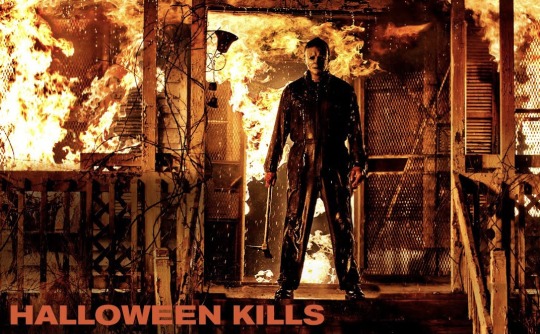
It hasn't even been that long since the last movie. Y'all remember what was going on, right?! Yeah, me neither.
Let's review:
Pretty much, M.M. has been chasing Jamie Lee Curtis (Laurie)

around for damn near 40 years. Let's pause a second to acknowledge M.M's diligence. In these decades, he could have given up on her, and moved on with his life, starting a career (I can see him as a basketball coach, can't you??), and rockin a family. Nope! He said "I'm going to finish what I started!". That's the heart of a champion... or horror's biggest loser... depends on your perspective:) In the last movie, JLC is tired of running, and decides to set a trap for Michael; and it works!

Michael is trapped in the basement as the house is engulfed in flames. But, as we see in the trailer, firefighters are all about saving people from burning up, so they help M.M (idiots!). So, here we are!
The plot, as usual, is simple: It's Halloween. He's Michael Bleepin Myers. It's time to kill!
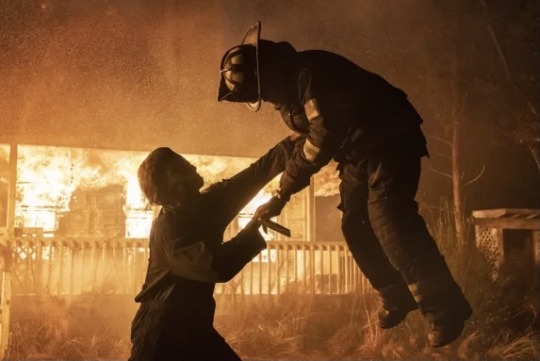
It's nothing personal (EXCEPT with Laurie - but she's been making him look stupid for 40 years, so that's understandable). Everybody else that Michael is after is just kinda at the wrong place at the wrong time. I felt kinda sorry for Laurie. I mean... she's old now. Michael Myers has been terrorizing her for all of this time.

I talked about how Michael could have moved on, but Laurie hasn't moved on either; she can't though, I guess. She's got PTSD. Her and her family are cursed. Now, she's laying in a hospital bed from being stabbed by Michael in the last movie. When's it going to end??! Seriously, when is it going to end... for Jamie Lee Curtis. She can't want to keep doing this, right?? I can see her begging the writers to kill her off. They keep telling her that they will, but they never do (assholes).
There's a line in here from Laurie "We always fight!" Idk, Laurie... it's ok to give up. It's ok to run and never look back. It's ok to abandon your home when there's a supernatural serial killer on the loose (and he IS supernatural, but we'll cover that later).
There's a black couple in this film, whom I wish would have taken my advice to run. The woman runs from her car, she finds her husband and says to him "I think Michael Myers is in the back seat. Go check it out!"
'GO CHECK IT OUT'?! Are you kidding me?! At this point, they all know that M.M. is on the loose and close by. They just heard stories of his kills. Her husband is NOT armed. 'GO CHECK IT OUT'?! People, if your significant other ever asks you to go check the danger out, THEY DO NOT LOVE YOU! Leave them! Pssh 'go check it out" - she must be out her damned mind! But, of course he does check it out (like a dope). I'm not saying whether they die or not, but... *smh* that marriage was doomed to fail anyway. "Hey.honey, there's an alligator in our backyard. Go check it out! Nah, don't call anybody. You do it."
"Hey, honey, did you hear that? Sounded like shots fired, from down the street... go check it out."
"This soup is probably still boiling hot. You should definitely check it out."
I love the kills in this movie! Normally, in these types of movies, they're killing off stupid people or obnoxious people or people who just finished having unprotected sex, but here people are mainly just enjoying life. Most are chillin in their homes, having fun on Halloween. It's funny , because the cops keep telling everyone to go home and lock their doors, so they'll be safe. But, M.M. is breaking into random homes to kill folks now. Well, one of these homes is not so random. There's a couple that bought Michael's old home; the home that in all of these movies, he's always trying to get back to, so he can stare out the window (and his theme music can play); that's really all he wants to do.

Why the hell would you ever buy that home?! This is Michael Myers! No alarm systems, or guard dogs, or guns, or baseball bats are going to protect you. If you find yourself in a room with Michael Myers you are dead. As stupid as this couple was, I really liked them! - not... that I'm saying whether they died or not. Maybe they were the ones to survive an encounter with M.M... in his old home... where he always goes... to NOT be disturbed. No spoilers here, people:)
It's not just Myers who is the evil in this film, but more so the fear that he causes. Fear makes people stupid. The people form an angry mob, so they could combine the powers of their individual stupidity. Whenever angry white people start gathering and chanting, you know something bad is about to happen. There were three black people in this movie though. Unfortunately, one is the law in that town, who has been failing miserably, and then this couple...

with wife kept telling her dope of a husband to 'go check it out!'.
Not a good rep for my people :)
There was one voice of reason in this movie, and her name is Judy Greer.

She keeps shouting down the stupidity, and the angry mob keeps looking at her as if she's speaking some foreign language, only to proceed with their rage. Do you ever feel that way? Like the only voice of reason around, and no one is even trying to hear you out? Then, you can relate to her.
The whole movie, I kept screaming "Will y'all please shut up and listen to Judy!" She's the main hero, in a way... JLC spends most of her time in a hospital bed. I suppose that's where she belongs though, since she's been stabbed. That's kind of a bummer for anyone who's expecting a big showdown between Laurie and Michael. JLC is barely in this movie.
It's really just Judy and this dude
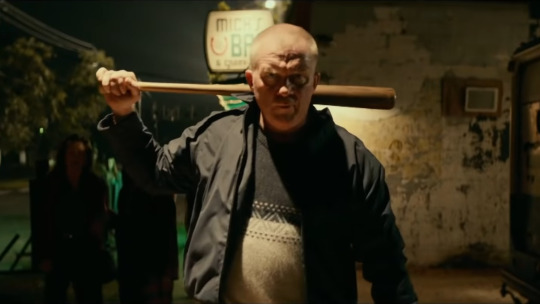
(Anthony Michael Hall, mutha bleepers!) - with a hard-on for sweet-Michael Myers-revenge, and carrying a bat with the words "Old Huckleberry" written on it. Yeah, you just know he's gonna die... NOT THAT HE DOES :) He's the one leading the angry mob in their chant of "Evil dies tonight!"
There's chanting. Myers kills. The mob is stupid. JLC is in pain (there's a scene where she stabs herself with a needle of painkillers... she stabs herself right in the ass. Whew! You feel that as much as any kill. The whole audience was like "OHHHHHH, good God, Jamie!"
Judy Greer shouts. No one listens. And Michael keeps killing. Apparently, the more he kills, the more he "transcends" into... some immortal being blah blah blah... Idk. They spurted some gibberish like that in the movie to try and explain away how he's still alive, but... meh. It's just that - gibberish. We gotta be careful - people are believing a lot of stupid things these days. What if someone were to believe that killing equals immortal power?? You're probably thinking “that's silly”. Well, to that I say, read some of the conspiracy theories floating around these days, and then ask yourself - "Is it?"
Grade: Hmm... I didn't really have any issues with the movie. Though I'm not a die hard fan, so those who geek-out over this franchise might desire things to be here that aren't, and so not like the movie (some of the reviews suggest as such). There are things that would have made it better. I'm fine with JLC not being as involved as much in this movie. She's probably tired, plus it's more about the fear that Michael causes the town than a battle between Laurie and Michael - we've gotten enough of that over 40 years. But, without a main goodie, there's a bit of a void. Judy goes in that direction, but... meh. I think this is a missed opportunity. I would have loved to see Judy Greer gain 30 to 40 pounds of sheer muscle for this role. She rips off her shirt to reveal those guns and back muscles. A slow-mo pummeling of Michael Myers from Judy Say-My-Name Greer

- that would have been GLORIOUS!
The ending is kinda weak... and confusing... and unnecessary. You never want to end on a "what?" But, besides all of that, i really liked it! As a slasher movie, it delivers. B+
Michael Myers is at his scariest in this one. I remember making fun of his hair in the last one. Not, his actual hair, but the hair on the mask. He was balding in the last one. But, now, his implant game is strong!

His mask has even gotten some work done to the face. You know how some older people... well, ALL older people gain "character" to their faces over time, and sometimes this makes them sexier? I feel like Michael's mask has got that going on. Like, he's been through some shit, and he's ok with it. Confidence is always sexy; even on Michael Myers. We just gotta get him a better wardrobe. Maybe get him a suit, then maybe he could kill a higher class of people, and maybe even find a Mrs. Myers. Especially now that he's immortal. I just want to see him living his best life.

#halloween kills#johnpraphit#praphitproductions.com#halloween#michaelmyers#jamieleecurtis#lauriestrode#praphit#horrormovies#moviereviews#relationships#love#slashers#survival#judygreer
3 notes
·
View notes
Text
7 Editing Tips That’ll Make You a Better Writer (with Examples!)
There are some bloggers who seem to have a natural gift when it comes to writing. Some bloggers seem to be naturally gifted writers.
They manage to get their ideas across clearly and economically, which means that readers can easily follow what they write. Readers devour their clear, economical prose.
Not only is there a lot of respect for what they have to say, but also the way that they say it. People respect what they say — and love how they say it.
Whenever they publish a new post on their blog, it always gets dozens of comments and hundreds of shares. Every new blog post attracts dozens of comments and hundreds of shares.
It would be great to be as successful as they are, but you don’t know what you need to do to make your writing better. You’d love to emulate their success, but you don’t know how.
The good news is that there are some editing tips that can easily learn which will improve everything you write from now on. Fortunately for you, a few simple editing tips can transform your writing forever.
Download a free PDF cheat sheet with seven questions that make it easy to edit your writing like a pro. Click here.
The Unfair Advantage Popular Writers Try to Hide
You know your writing heroes? Would you be shocked to learn that their writing is no better than yours?
Sure, the end product is better, but the first draft is just as clumsy, flabby, and downright difficult to read as any of your own writing efforts.
What popular bloggers know that many people don’t know (or don’t want to believe) is that a post isn’t finished simply because they’ve said everything they want to say. In many ways that’s just the beginning.
Think of your draft as a rough diamond. Value is hidden inside it and you need an expert gem cutter to reveal its beauty and clarity.
Which is why many top bloggers hire a professional editor to transform their rough diamonds into gleaming jewels. That’s right — someone else is helping them.
Somewhat unfair, right?
No wonder their writing seems so much better than yours. And even those bloggers who don’t use an editor have simply learned how to edit their own posts like a pro.
Fortunately, editing isn’t rocket science. If you have someone to show you how.
So let’s break down the rules that’ll help you transform your unremarkable draft into a perfectly polished post.
7 Editing Tips That Will Totally Transform Your Next Post
Tip #1. Don’t Pad Your Prose with Empty Filler Words
(Or: Avoid Using Grammar Expletives)
Grammar expletives are literary constructions that begin with the words it, here, or there followed by a form of the verb to be.
(Expletive comes from the Latin explere, meaning to fill. Think smelly literary landfill).
Common constructions include it is, it was, it won’t, it takes, here is, there is, there will be.
The problem? When it, here, and there refer to nouns later in the sentence or — worse — to something unnamed, they weaken your writing by shifting emphasis away from the true drivers of your sentences. And they usually require other support words such as who, that, and when, which further dilute your writing.
Let’s look at an example:
There are some bloggers who seem to have…
The there are expletive places the sentence’s focus on some nebulous thing called there instead of the true focus of the sentence — some bloggers. And the writer must then use another unnecessary word — who — that’s three unnecessary words in one unfocused sentence.
Train yourself to spot instances of there, here, and it followed by a to be verb (such as is, are, was, and were) and adjust your sentences to lead with the meat and potatoes of those sentences instead.
(Tip: Use your word processor’s find functionality and search for there, here, and it and determine if you’ve used an expletive).
Other before-and-after examples:
It’s fun to edit — Editing is fun
It takes time to write — Writing takes time
There are many people who write — Many people write
There’s nothing better than blogging — Nothing’s better than blogging
Here are some things to consider: — Some things to consider are:
Caveat: If you previously described an object using there, here, and it, you’re not guilty of an expletive infraction. For example:
I love editing. It’s fun. (This is not an expletive construction since I previously described what it refers to.)
Tip #2. Don’t Weaken the Action with Wimpy Words
(Or: Avoid Weak Verbs; Use Visceral and Action Verbs Instead)
Not only does to be conspire with it, there, and here to create nasty grammar expletives, but it’s also responsible for its own class of sentence impairing constructions.
Certain uses of to be in its various forms weaken the words that follow. The solution is to replace these lightweights with more powerful alternatives.
Let’s see some before-and-after examples:
She is blogging — She blogs
People are in love with him — People love him
He is aware that people love him — He knows people love him
Other verbs besides to be verbs can lack strength as well. Use visceral verbs or verbs that express some action. Let’s edit:
Give out — Offer
Find out — Discover
Make it clearer — Clarify
I can’t make it to the party — I can’t attend the party
He went to Mexico — He traveled to Mexico
Think of a blogging strategy — Devise a blogging strategy
Tip #3. Don’t Cripple Your Descriptions with Feeble Phrases
(Or: Avoid Weak Adjectives)
Weak adjectives sap the strength from your writing just as nefariously as weak verbs. Use the best adjectives possible when describing nouns and pronouns. And be mindful that certain words, like really and very, usually precede weak adjectives. Take a look:
Really bad — Terrible
Really good — Great
Very big — Huge
Very beautiful — Gorgeous
Even if you don’t have a telltale really or very preceding an adjective, you can often give your writing more impact by using stronger alternatives:
Dirty — Filthy
Tired — Exhausted
Scared — Terrified
Happy — Thrilled
Even worse than using weak adjectives is using weak adjectives to tell your readers what something isn’t as opposed to telling them what something is:
It’s not that good — It’s terrible
He’s not a bore — He’s hilarious
He’s not very smart — He’s ignorant
Tip #4. Trim Flabby Words and Phrases
(Or: Avoid Verbose Colloquialisms)
Today’s readers have limited time and patience for flabby writing. Their cursors hover over the back button, so say what you mean as concisely as possible before your readers vanish:
But the fact of the matter is — But (Avoid flabby colloquial expressions when possible)
Editing is absolutely essential — Editing is essential (Absolutely is redundant)
You’re going to have to edit your work — You’ll have to edit your work or You must edit your work (Going to and going to have to are flabby expressions)
Due to the fact that editing takes time, some people avoid it — Because editing takes time, some people avoid it
Every single person should love editing — Every person should love editing (Single is redundant; and shouldn’t married people love editing too? 😉 )
Tip #5. Don’t Pussyfoot Around Your Verbs and Adjectives
(Or: Avoid Nominalization)
Nominalization occurs when a writer uses a weak noun equivalent when a stronger verb or adjective replacement is available. Like expletives, nominals usually introduce other unnecessary words when used.
Count the number of words in the before-and-after examples below, and you will witness how badly nominals weaken your writing:
Give your post a proofread — Proofread your post (verb form)
Alcohol is the cause of hangovers — Alcohol causes hangovers (verb form)
The plane’s approach was met with the scramble of emergency crews — The plane approached and emergency crews scrambled. (verb form)
He shows signs of carelessness — He is careless (adjective form)
She has a high level of intensity — She is intense (adjective form)
Tip #6. Throw Out the Rulebook on Punctuation
(Or: Use the Occasional Comma for Clarity)
The rules around punctuation can be complicated, even for the humble comma.
But do you truly need to know the difference between a serial comma, an Oxford comma, and a Harvard comma to write a great blog post? Of course not. (And it’s a trick question — they’re all the same.)
So my philosophy on commas is simple:
Use commas sparingly if you prefer, but if excluding a comma MAKES YOUR READER STOP READING, add another bleepin’ comma — regardless of what any comma police may say.
Let’s look at an example:
You can ignore editing and people reading your post may not notice but your ideas will get lost.
By not including a comma between editing and and, I read this sentence and asked myself, “I can ignore editing and people reading my post? Really?” Of course, readers work out the intended meaning a moment later, but by that time, they’ve already stalled.
So, regardless of what comma rule I may break by adding a comma to this sentence, as long as my readers don’t get confused and stop reading, I don’t care — and neither should you.
Let’s look at another example that needs a comma for clarity:
One day, when you find success you can pull out your golden pen and write me a thank-you letter.
By not including a comma between success and you, I read this sentence and asked myself, “Is success something you can pull out of a golden pen?”
Regardless of your stance on commas, you ultimately want your readers to keep reading. You want them to continue down your slippery slope of powerful content and transitional phrases all the way to your call to action — without getting jarred from their trance to contemplate commas with their inner editors or a Google search.
Tip #7. Be As Manipulative As Possible
(Or: Use Noun Modifiers Whenever You Can)
You won’t use this technique often, but at least be mindful of it.
When we use two nouns together with the first noun modifying the second, we are using noun modifiers. I like them because they hack the flab from our writing by shortening our sentences. Let’s review some examples:
Tips on editing — Editing tips
Great advice on how to boost traffic — Great traffic-boosting advice (Traffic-boosting is a compound noun here)
Information regarding registration — Registration information
These sentences have prepositions between the noun sets. Whenever you spot this construction, try to implement this noun-modifying technique.
Download a free PDF cheat sheet with seven questions that make it easy to edit your writing like a pro. Click here.
What’s Your Excuse Now?
These editing tips are not magical, mystical, or complicated. In fact, you could consider them downright boring, plain, and inconsequential.
But applying smart editing rules is what separates your heroes from the masses, catapults them to success, and makes readers say, “I don’t know what it is about their writing, but it’s absolutely fantastic.”
Look at it this way: You’ve expended a ton of effort on SEO, content marketing, networking, and social media promotion, all in the hopes that more people will notice your blog. So when they arrive, shouldn’t your next post blow their socks off too?
And how about your last post and the one before that? (Yes, you can apply these rules to your old posts too!)
Or are you one of those writers who think they write well enough already? Well, you might be surprised by just how many of these crimes against clarity you’re committing.
Open one of your posts right now and see how many of these editing tips you can apply.
Read each word of your post. Is the word an expletive? Is it a weak verb? A weak adjective? Does it represent nominalization or flab or break any of the other rules mentioned in this post?
Run each word of your post through this a checklist of editing tips. You will find something to improve. And your writing will be 100% more powerful as a result.
Because the search for perfection never ends.
And your writing is never too good.
Sure, proofreading and editing take time.
And yes, you’re already busy enough.
But your writing heroes edit, and they land the guest posts, book deals, and exposure you only wish you could.
So, take a break from #amwriting and start #amediting right now.
Your success will thank you.
And so will I.
About the Author: Shane Arthur is a former copyeditor for Jon Morrow’s kick-butt Guest Blogging Certification Program (affiliate link) that teaches writers just like you how to get their work featured on the world’s biggest blogs and online magazines.
The post 7 Editing Tips That’ll Make You a Better Writer (with Examples!) appeared first on Smart Blogger.
from SEO and SM Tips https://smartblogger.com/editing-tips/
0 notes
Text
7 Editing Tips That’ll Make You a Better Writer (with Examples!)
There are some bloggers who seem to have a natural gift when it comes to writing. Some bloggers seem to be naturally gifted writers.
They manage to get their ideas across clearly and economically, which means that readers can easily follow what they write. Readers devour their clear, economical prose.
Not only is there a lot of respect for what they have to say, but also the way that they say it. People respect what they say — and love how they say it.
Whenever they publish a new post on their blog, it always gets dozens of comments and hundreds of shares. Every new blog post attracts dozens of comments and hundreds of shares.
It would be great to be as successful as they are, but you don’t know what you need to do to make your writing better. You’d love to emulate their success, but you don’t know how.
The good news is that there are some editing tips that can easily learn which will improve everything you write from now on. Fortunately for you, a few simple editing tips can transform your writing forever.
Download a free PDF cheat sheet with seven questions that make it easy to edit your writing like a pro. Click here.
The Unfair Advantage Popular Writers Try to Hide
You know your writing heroes? Would you be shocked to learn that their writing is no better than yours?
Sure, the end product is better, but the first draft is just as clumsy, flabby, and downright difficult to read as any of your own writing efforts.
What popular bloggers know that many people don’t know (or don’t want to believe) is that a post isn’t finished simply because they’ve said everything they want to say. In many ways that’s just the beginning.
Think of your draft as a rough diamond. Value is hidden inside it and you need an expert gem cutter to reveal its beauty and clarity.
Which is why many top bloggers hire a professional editor to transform their rough diamonds into gleaming jewels. That’s right — someone else is helping them.
Somewhat unfair, right?
No wonder their writing seems so much better than yours. And even those bloggers who don’t use an editor have simply learned how to edit their own posts like a pro.
Fortunately, editing isn’t rocket science. If you have someone to show you how.
So let’s break down the rules that’ll help you transform your unremarkable draft into a perfectly polished post.
7 Editing Tips That Will Totally Transform Your Next Post
Tip #1. Don’t Pad Your Prose with Empty Filler Words
(Or: Avoid Using Grammar Expletives)
Grammar expletives are literary constructions that begin with the words it, here, or there followed by a form of the verb to be.
(Expletive comes from the Latin explere, meaning to fill. Think smelly literary landfill).
Common constructions include it is, it was, it won’t, it takes, here is, there is, there will be.
The problem? When it, here, and there refer to nouns later in the sentence or — worse — to something unnamed, they weaken your writing by shifting emphasis away from the true drivers of your sentences. And they usually require other support words such as who, that, and when, which further dilute your writing.
Let’s look at an example:
There are some bloggers who seem to have…
The there are expletive places the sentence’s focus on some nebulous thing called there instead of the true focus of the sentence — some bloggers. And the writer must then use another unnecessary word — who — that’s three unnecessary words in one unfocused sentence.
Train yourself to spot instances of there, here, and it followed by a to be verb (such as is, are, was, and were) and adjust your sentences to lead with the meat and potatoes of those sentences instead.
(Tip: Use your word processor’s find functionality and search for there, here, and it and determine if you’ve used an expletive).
Other before-and-after examples:
It’s fun to edit — Editing is fun
It takes time to write — Writing takes time
There are many people who write — Many people write
There’s nothing better than blogging — Nothing’s better than blogging
Here are some things to consider: — Some things to consider are:
Caveat: If you previously described an object using there, here, and it, you’re not guilty of an expletive infraction. For example:
I love editing. It’s fun. (This is not an expletive construction since I previously described what it refers to.)
Tip #2. Don’t Weaken the Action with Wimpy Words
(Or: Avoid Weak Verbs; Use Visceral and Action Verbs Instead)
Not only does to be conspire with it, there, and here to create nasty grammar expletives, but it’s also responsible for its own class of sentence impairing constructions.
Certain uses of to be in its various forms weaken the words that follow. The solution is to replace these lightweights with more powerful alternatives.
Let’s see some before-and-after examples:
She is blogging — She blogs
People are in love with him — People love him
He is aware that people love him — He knows people love him
Other verbs besides to be verbs can lack strength as well. Use visceral verbs or verbs that express some action. Let’s edit:
Give out — Offer
Find out — Discover
Make it clearer — Clarify
I can’t make it to the party — I can’t attend the party
He went to Mexico — He traveled to Mexico
Think of a blogging strategy — Devise a blogging strategy
Tip #3. Don’t Cripple Your Descriptions with Feeble Phrases
(Or: Avoid Weak Adjectives)
Weak adjectives sap the strength from your writing just as nefariously as weak verbs. Use the best adjectives possible when describing nouns and pronouns. And be mindful that certain words, like really and very, usually precede weak adjectives. Take a look:
Really bad — Terrible
Really good — Great
Very big — Huge
Very beautiful — Gorgeous
Even if you don’t have a telltale really or very preceding an adjective, you can often give your writing more impact by using stronger alternatives:
Dirty — Filthy
Tired — Exhausted
Scared — Terrified
Happy — Thrilled
Even worse than using weak adjectives is using weak adjectives to tell your readers what something isn’t as opposed to telling them what something is:
It’s not that good — It’s terrible
He’s not a bore — He’s hilarious
He’s not very smart — He’s ignorant
Tip #4. Trim Flabby Words and Phrases
(Or: Avoid Verbose Colloquialisms)
Today’s readers have limited time and patience for flabby writing. Their cursors hover over the back button, so say what you mean as concisely as possible before your readers vanish:
But the fact of the matter is — But (Avoid flabby colloquial expressions when possible)
Editing is absolutely essential — Editing is essential (Absolutely is redundant)
You’re going to have to edit your work — You’ll have to edit your work or You must edit your work (Going to and going to have to are flabby expressions)
Due to the fact that editing takes time, some people avoid it — Because editing takes time, some people avoid it
Every single person should love editing — Every person should love editing (Single is redundant; and shouldn’t married people love editing too? 😉 )
Tip #5. Don’t Pussyfoot Around Your Verbs and Adjectives
(Or: Avoid Nominalization)
Nominalization occurs when a writer uses a weak noun equivalent when a stronger verb or adjective replacement is available. Like expletives, nominals usually introduce other unnecessary words when used.
Count the number of words in the before-and-after examples below, and you will witness how badly nominals weaken your writing:
Give your post a proofread — Proofread your post (verb form)
Alcohol is the cause of hangovers — Alcohol causes hangovers (verb form)
The plane’s approach was met with the scramble of emergency crews — The plane approached and emergency crews scrambled. (verb form)
He shows signs of carelessness — He is careless (adjective form)
She has a high level of intensity — She is intense (adjective form)
Tip #6. Throw Out the Rulebook on Punctuation
(Or: Use the Occasional Comma for Clarity)
The rules around punctuation can be complicated, even for the humble comma.
But do you truly need to know the difference between a serial comma, an Oxford comma, and a Harvard comma to write a great blog post? Of course not. (And it’s a trick question — they’re all the same.)
So my philosophy on commas is simple:
Use commas sparingly if you prefer, but if excluding a comma MAKES YOUR READER STOP READING, add another bleepin’ comma — regardless of what any comma police may say.
Let’s look at an example:
You can ignore editing and people reading your post may not notice but your ideas will get lost.
By not including a comma between editing and and, I read this sentence and asked myself, “I can ignore editing and people reading my post? Really?” Of course, readers work out the intended meaning a moment later, but by that time, they’ve already stalled.
So, regardless of what comma rule I may break by adding a comma to this sentence, as long as my readers don’t get confused and stop reading, I don’t care — and neither should you.
Let’s look at another example that needs a comma for clarity:
One day, when you find success you can pull out your golden pen and write me a thank-you letter.
By not including a comma between success and you, I read this sentence and asked myself, “Is success something you can pull out of a golden pen?”
Regardless of your stance on commas, you ultimately want your readers to keep reading. You want them to continue down your slippery slope of powerful content and transitional phrases all the way to your call to action — without getting jarred from their trance to contemplate commas with their inner editors or a Google search.
Tip #7. Be As Manipulative As Possible
(Or: Use Noun Modifiers Whenever You Can)
You won’t use this technique often, but at least be mindful of it.
When we use two nouns together with the first noun modifying the second, we are using noun modifiers. I like them because they hack the flab from our writing by shortening our sentences. Let’s review some examples:
Tips on editing — Editing tips
Great advice on how to boost traffic — Great traffic-boosting advice (Traffic-boosting is a compound noun here)
Information regarding registration — Registration information
These sentences have prepositions between the noun sets. Whenever you spot this construction, try to implement this noun-modifying technique.
Download a free PDF cheat sheet with seven questions that make it easy to edit your writing like a pro. Click here.
What’s Your Excuse Now?
These editing tips are not magical, mystical, or complicated. In fact, you could consider them downright boring, plain, and inconsequential.
But applying smart editing rules is what separates your heroes from the masses, catapults them to success, and makes readers say, “I don’t know what it is about their writing, but it’s absolutely fantastic.”
Look at it this way: You’ve expended a ton of effort on SEO, content marketing, networking, and social media promotion, all in the hopes that more people will notice your blog. So when they arrive, shouldn’t your next post blow their socks off too?
And how about your last post and the one before that? (Yes, you can apply these rules to your old posts too!)
Or are you one of those writers who think they write well enough already? Well, you might be surprised by just how many of these crimes against clarity you’re committing.
Open one of your posts right now and see how many of these editing tips you can apply.
Read each word of your post. Is the word an expletive? Is it a weak verb? A weak adjective? Does it represent nominalization or flab or break any of the other rules mentioned in this post?
Run each word of your post through this a checklist of editing tips. You will find something to improve. And your writing will be 100% more powerful as a result.
Because the search for perfection never ends.
And your writing is never too good.
Sure, proofreading and editing take time.
And yes, you’re already busy enough.
But your writing heroes edit, and they land the guest posts, book deals, and exposure you only wish you could.
So, take a break from #amwriting and start #amediting right now.
Your success will thank you.
And so will I.
About the Author: Shane Arthur is a former copyeditor for Jon Morrow’s kick-butt Guest Blogging Certification Program (affiliate link) that teaches writers just like you how to get their work featured on the world’s biggest blogs and online magazines.
The post 7 Editing Tips That’ll Make You a Better Writer (with Examples!) appeared first on Smart Blogger.
source https://smartblogger.com/editing-tips/
0 notes
Text
7 Editing Tips That’ll Make You a Better Writer (with Examples!)
There are some bloggers who seem to have a natural gift when it comes to writing. Some bloggers seem to be naturally gifted writers.
They manage to get their ideas across clearly and economically, which means that readers can easily follow what they write. Readers devour their clear, economical prose.
Not only is there a lot of respect for what they have to say, but also the way that they say it. People respect what they say — and love how they say it.
Whenever they publish a new post on their blog, it always gets dozens of comments and hundreds of shares. Every new blog post attracts dozens of comments and hundreds of shares.
It would be great to be as successful as they are, but you don’t know what you need to do to make your writing better. You’d love to emulate their success, but you don’t know how.
The good news is that there are some editing tips that can easily learn which will improve everything you write from now on. Fortunately for you, a few simple editing tips can transform your writing forever.
Download a free PDF cheat sheet with seven questions that make it easy to edit your writing like a pro. Click here.
The Unfair Advantage Popular Writers Try to Hide
You know your writing heroes? Would you be shocked to learn that their writing is no better than yours?
Sure, the end product is better, but the first draft is just as clumsy, flabby, and downright difficult to read as any of your own writing efforts.
What popular bloggers know that many people don’t know (or don’t want to believe) is that a post isn’t finished simply because they’ve said everything they want to say. In many ways that’s just the beginning.
Think of your draft as a rough diamond. Value is hidden inside it and you need an expert gem cutter to reveal its beauty and clarity.
Which is why many top bloggers hire a professional editor to transform their rough diamonds into gleaming jewels. That’s right — someone else is helping them.
Somewhat unfair, right?
No wonder their writing seems so much better than yours. And even those bloggers who don’t use an editor have simply learned how to edit their own posts like a pro.
Fortunately, editing isn’t rocket science. If you have someone to show you how.
So let’s break down the rules that’ll help you transform your unremarkable draft into a perfectly polished post.
7 Editing Tips That Will Totally Transform Your Next Post
Tip #1. Don’t Pad Your Prose with Empty Filler Words
(Or: Avoid Using Grammar Expletives)
Grammar expletives are literary constructions that begin with the words it, here, or there followed by a form of the verb to be.
(Expletive comes from the Latin explere, meaning to fill. Think smelly literary landfill).
Common constructions include it is, it was, it won’t, it takes, here is, there is, there will be.
The problem? When it, here, and there refer to nouns later in the sentence or — worse — to something unnamed, they weaken your writing by shifting emphasis away from the true drivers of your sentences. And they usually require other support words such as who, that, and when, which further dilute your writing.
Let’s look at an example:
There are some bloggers who seem to have…
The there are expletive places the sentence’s focus on some nebulous thing called there instead of the true focus of the sentence — some bloggers. And the writer must then use another unnecessary word — who — that’s three unnecessary words in one unfocused sentence.
Train yourself to spot instances of there, here, and it followed by a to be verb (such as is, are, was, and were) and adjust your sentences to lead with the meat and potatoes of those sentences instead.
(Tip: Use your word processor’s find functionality and search for there, here, and it and determine if you’ve used an expletive).
Other before-and-after examples:
It’s fun to edit — Editing is fun
It takes time to write — Writing takes time
There are many people who write — Many people write
There’s nothing better than blogging — Nothing’s better than blogging
Here are some things to consider: — Some things to consider are:
Caveat: If you previously described an object using there, here, and it, you’re not guilty of an expletive infraction. For example:
I love editing. It’s fun. (This is not an expletive construction since I previously described what it refers to.)
Tip #2. Don’t Weaken the Action with Wimpy Words
(Or: Avoid Weak Verbs; Use Visceral and Action Verbs Instead)
Not only does to be conspire with it, there, and here to create nasty grammar expletives, but it’s also responsible for its own class of sentence impairing constructions.
Certain uses of to be in its various forms weaken the words that follow. The solution is to replace these lightweights with more powerful alternatives.
Let’s see some before-and-after examples:
She is blogging — She blogs
People are in love with him — People love him
He is aware that people love him — He knows people love him
Other verbs besides to be verbs can lack strength as well. Use visceral verbs or verbs that express some action. Let’s edit:
Give out — Offer
Find out — Discover
Make it clearer — Clarify
I can’t make it to the party — I can’t attend the party
He went to Mexico — He traveled to Mexico
Think of a blogging strategy — Devise a blogging strategy
Tip #3. Don’t Cripple Your Descriptions with Feeble Phrases
(Or: Avoid Weak Adjectives)
Weak adjectives sap the strength from your writing just as nefariously as weak verbs. Use the best adjectives possible when describing nouns and pronouns. And be mindful that certain words, like really and very, usually precede weak adjectives. Take a look:
Really bad — Terrible
Really good — Great
Very big — Huge
Very beautiful — Gorgeous
Even if you don’t have a telltale really or very preceding an adjective, you can often give your writing more impact by using stronger alternatives:
Dirty — Filthy
Tired — Exhausted
Scared — Terrified
Happy — Thrilled
Even worse than using weak adjectives is using weak adjectives to tell your readers what something isn’t as opposed to telling them what something is:
It’s not that good — It’s terrible
He’s not a bore — He’s hilarious
He’s not very smart — He’s ignorant
Tip #4. Trim Flabby Words and Phrases
(Or: Avoid Verbose Colloquialisms)
Today’s readers have limited time and patience for flabby writing. Their cursors hover over the back button, so say what you mean as concisely as possible before your readers vanish:
But the fact of the matter is — But (Avoid flabby colloquial expressions when possible)
Editing is absolutely essential — Editing is essential (Absolutely is redundant)
You’re going to have to edit your work — You’ll have to edit your work or You must edit your work (Going to and going to have to are flabby expressions)
Due to the fact that editing takes time, some people avoid it — Because editing takes time, some people avoid it
Every single person should love editing — Every person should love editing (Single is redundant; and shouldn’t married people love editing too? 😉 )
Tip #5. Don’t Pussyfoot Around Your Verbs and Adjectives
(Or: Avoid Nominalization)
Nominalization occurs when a writer uses a weak noun equivalent when a stronger verb or adjective replacement is available. Like expletives, nominals usually introduce other unnecessary words when used.
Count the number of words in the before-and-after examples below, and you will witness how badly nominals weaken your writing:
Give your post a proofread — Proofread your post (verb form)
Alcohol is the cause of hangovers — Alcohol causes hangovers (verb form)
The plane’s approach was met with the scramble of emergency crews — The plane approached and emergency crews scrambled. (verb form)
He shows signs of carelessness — He is careless (adjective form)
She has a high level of intensity — She is intense (adjective form)
Tip #6. Throw Out the Rulebook on Punctuation
(Or: Use the Occasional Comma for Clarity)
The rules around punctuation can be complicated, even for the humble comma.
But do you truly need to know the difference between a serial comma, an Oxford comma, and a Harvard comma to write a great blog post? Of course not. (And it’s a trick question — they’re all the same.)
So my philosophy on commas is simple:
Use commas sparingly if you prefer, but if excluding a comma MAKES YOUR READER STOP READING, add another bleepin’ comma — regardless of what any comma police may say.
Let’s look at an example:
You can ignore editing and people reading your post may not notice but your ideas will get lost.
By not including a comma between editing and and, I read this sentence and asked myself, “I can ignore editing and people reading my post? Really?” Of course, readers work out the intended meaning a moment later, but by that time, they’ve already stalled.
So, regardless of what comma rule I may break by adding a comma to this sentence, as long as my readers don’t get confused and stop reading, I don’t care — and neither should you.
Let’s look at another example that needs a comma for clarity:
One day, when you find success you can pull out your golden pen and write me a thank-you letter.
By not including a comma between success and you, I read this sentence and asked myself, “Is success something you can pull out of a golden pen?”
Regardless of your stance on commas, you ultimately want your readers to keep reading. You want them to continue down your slippery slope of powerful content and transitional phrases all the way to your call to action — without getting jarred from their trance to contemplate commas with their inner editors or a Google search.
Tip #7. Be As Manipulative As Possible
(Or: Use Noun Modifiers Whenever You Can)
You won’t use this technique often, but at least be mindful of it.
When we use two nouns together with the first noun modifying the second, we are using noun modifiers. I like them because they hack the flab from our writing by shortening our sentences. Let’s review some examples:
Tips on editing — Editing tips
Great advice on how to boost traffic — Great traffic-boosting advice (Traffic-boosting is a compound noun here)
Information regarding registration — Registration information
These sentences have prepositions between the noun sets. Whenever you spot this construction, try to implement this noun-modifying technique.
Download a free PDF cheat sheet with seven questions that make it easy to edit your writing like a pro. Click here.
What’s Your Excuse Now?
These editing tips are not magical, mystical, or complicated. In fact, you could consider them downright boring, plain, and inconsequential.
But applying smart editing rules is what separates your heroes from the masses, catapults them to success, and makes readers say, “I don’t know what it is about their writing, but it’s absolutely fantastic.”
Look at it this way: You’ve expended a ton of effort on SEO, content marketing, networking, and social media promotion, all in the hopes that more people will notice your blog. So when they arrive, shouldn’t your next post blow their socks off too?
And how about your last post and the one before that? (Yes, you can apply these rules to your old posts too!)
Or are you one of those writers who think they write well enough already? Well, you might be surprised by just how many of these crimes against clarity you’re committing.
Open one of your posts right now and see how many of these editing tips you can apply.
Read each word of your post. Is the word an expletive? Is it a weak verb? A weak adjective? Does it represent nominalization or flab or break any of the other rules mentioned in this post?
Run each word of your post through this a checklist of editing tips. You will find something to improve. And your writing will be 100% more powerful as a result.
Because the search for perfection never ends.
And your writing is never too good.
Sure, proofreading and editing take time.
And yes, you’re already busy enough.
But your writing heroes edit, and they land the guest posts, book deals, and exposure you only wish you could.
So, take a break from #amwriting and start #amediting right now.
Your success will thank you.
And so will I.
About the Author: Shane Arthur is a former copyeditor for Jon Morrow’s kick-butt Guest Blogging Certification Program (affiliate link) that teaches writers just like you how to get their work featured on the world’s biggest blogs and online magazines.
The post 7 Editing Tips That’ll Make You a Better Writer (with Examples!) appeared first on Smart Blogger.
from Julia Garza Social Media Tips https://smartblogger.com/editing-tips/
0 notes
Text
7 Editing Tips That’ll Make You a Better Writer (with Examples!)
There are some bloggers who seem to have a natural gift when it comes to writing. Some bloggers seem to be naturally gifted writers.
They manage to get their ideas across clearly and economically, which means that readers can easily follow what they write. Readers devour their clear, economical prose.
Not only is there a lot of respect for what they have to say, but also the way that they say it. People respect what they say — and love how they say it.
Whenever they publish a new post on their blog, it always gets dozens of comments and hundreds of shares. Every new blog post attracts dozens of comments and hundreds of shares.
It would be great to be as successful as they are, but you don’t know what you need to do to make your writing better. You’d love to emulate their success, but you don’t know how.
The good news is that there are some editing tips that can easily learn which will improve everything you write from now on. Fortunately for you, a few simple editing tips can transform your writing forever.
Download a free PDF cheat sheet with seven questions that make it easy to edit your writing like a pro. Click here.
The Unfair Advantage Popular Writers Try to Hide
You know your writing heroes? Would you be shocked to learn that their writing is no better than yours?
Sure, the end product is better, but the first draft is just as clumsy, flabby, and downright difficult to read as any of your own writing efforts.
What popular bloggers know that many people don’t know (or don’t want to believe) is that a post isn’t finished simply because they’ve said everything they want to say. In many ways that’s just the beginning.
Think of your draft as a rough diamond. Value is hidden inside it and you need an expert gem cutter to reveal its beauty and clarity.
Which is why many top bloggers hire a professional editor to transform their rough diamonds into gleaming jewels. That’s right — someone else is helping them.
Somewhat unfair, right?
No wonder their writing seems so much better than yours. And even those bloggers who don’t use an editor have simply learned how to edit their own posts like a pro.
Fortunately, editing isn’t rocket science. If you have someone to show you how.
So let’s break down the rules that’ll help you transform your unremarkable draft into a perfectly polished post.
7 Editing Tips That Will Totally Transform Your Next Post
Tip #1. Don’t Pad Your Prose with Empty Filler Words
(Or: Avoid Using Grammar Expletives)
Grammar expletives are literary constructions that begin with the words it, here, or there followed by a form of the verb to be.
(Expletive comes from the Latin explere, meaning to fill. Think smelly literary landfill).
Common constructions include it is, it was, it won’t, it takes, here is, there is, there will be.
The problem? When it, here, and there refer to nouns later in the sentence or — worse — to something unnamed, they weaken your writing by shifting emphasis away from the true drivers of your sentences. And they usually require other support words such as who, that, and when, which further dilute your writing.
Let’s look at an example:
There are some bloggers who seem to have…
The there are expletive places the sentence’s focus on some nebulous thing called there instead of the true focus of the sentence — some bloggers. And the writer must then use another unnecessary word — who — that’s three unnecessary words in one unfocused sentence.
Train yourself to spot instances of there, here, and it followed by a to be verb (such as is, are, was, and were) and adjust your sentences to lead with the meat and potatoes of those sentences instead.
(Tip: Use your word processor’s find functionality and search for there, here, and it and determine if you’ve used an expletive).
Other before-and-after examples:
It’s fun to edit — Editing is fun
It takes time to write — Writing takes time
There are many people who write — Many people write
There’s nothing better than blogging — Nothing’s better than blogging
Here are some things to consider: — Some things to consider are:
Caveat: If you previously described an object using there, here, and it, you’re not guilty of an expletive infraction. For example:
I love editing. It’s fun. (This is not an expletive construction since I previously described what it refers to.)
Tip #2. Don’t Weaken the Action with Wimpy Words
(Or: Avoid Weak Verbs; Use Visceral and Action Verbs Instead)
Not only does to be conspire with it, there, and here to create nasty grammar expletives, but it’s also responsible for its own class of sentence impairing constructions.
Certain uses of to be in its various forms weaken the words that follow. The solution is to replace these lightweights with more powerful alternatives.
Let’s see some before-and-after examples:
She is blogging — She blogs
People are in love with him — People love him
He is aware that people love him — He knows people love him
Other verbs besides to be verbs can lack strength as well. Use visceral verbs or verbs that express some action. Let’s edit:
Give out — Offer
Find out — Discover
Make it clearer — Clarify
I can’t make it to the party — I can’t attend the party
He went to Mexico — He traveled to Mexico
Think of a blogging strategy — Devise a blogging strategy
Tip #3. Don’t Cripple Your Descriptions with Feeble Phrases
(Or: Avoid Weak Adjectives)
Weak adjectives sap the strength from your writing just as nefariously as weak verbs. Use the best adjectives possible when describing nouns and pronouns. And be mindful that certain words, like really and very, usually precede weak adjectives. Take a look:
Really bad — Terrible
Really good — Great
Very big — Huge
Very beautiful — Gorgeous
Even if you don’t have a telltale really or very preceding an adjective, you can often give your writing more impact by using stronger alternatives:
Dirty — Filthy
Tired — Exhausted
Scared — Terrified
Happy — Thrilled
Even worse than using weak adjectives is using weak adjectives to tell your readers what something isn’t as opposed to telling them what something is:
It’s not that good — It’s terrible
He’s not a bore — He’s hilarious
He’s not very smart — He’s ignorant
Tip #4. Trim Flabby Words and Phrases
(Or: Avoid Verbose Colloquialisms)
Today’s readers have limited time and patience for flabby writing. Their cursors hover over the back button, so say what you mean as concisely as possible before your readers vanish:
But the fact of the matter is — But (Avoid flabby colloquial expressions when possible)
Editing is absolutely essential — Editing is essential (Absolutely is redundant)
You’re going to have to edit your work — You’ll have to edit your work or You must edit your work (Going to and going to have to are flabby expressions)
Due to the fact that editing takes time, some people avoid it — Because editing takes time, some people avoid it
Every single person should love editing — Every person should love editing (Single is redundant; and shouldn’t married people love editing too? 😉 )
Tip #5. Don’t Pussyfoot Around Your Verbs and Adjectives
(Or: Avoid Nominalization)
Nominalization occurs when a writer uses a weak noun equivalent when a stronger verb or adjective replacement is available. Like expletives, nominals usually introduce other unnecessary words when used.
Count the number of words in the before-and-after examples below, and you will witness how badly nominals weaken your writing:
Give your post a proofread — Proofread your post (verb form)
Alcohol is the cause of hangovers — Alcohol causes hangovers (verb form)
The plane’s approach was met with the scramble of emergency crews — The plane approached and emergency crews scrambled. (verb form)
He shows signs of carelessness — He is careless (adjective form)
She has a high level of intensity — She is intense (adjective form)
Tip #6. Throw Out the Rulebook on Punctuation
(Or: Use the Occasional Comma for Clarity)
The rules around punctuation can be complicated, even for the humble comma.
But do you truly need to know the difference between a serial comma, an Oxford comma, and a Harvard comma to write a great blog post? Of course not. (And it’s a trick question — they’re all the same.)
So my philosophy on commas is simple:
Use commas sparingly if you prefer, but if excluding a comma MAKES YOUR READER STOP READING, add another bleepin’ comma — regardless of what any comma police may say.
Let’s look at an example:
You can ignore editing and people reading your post may not notice but your ideas will get lost.
By not including a comma between editing and and, I read this sentence and asked myself, “I can ignore editing and people reading my post? Really?” Of course, readers work out the intended meaning a moment later, but by that time, they’ve already stalled.
So, regardless of what comma rule I may break by adding a comma to this sentence, as long as my readers don’t get confused and stop reading, I don’t care — and neither should you.
Let’s look at another example that needs a comma for clarity:
One day, when you find success you can pull out your golden pen and write me a thank-you letter.
By not including a comma between success and you, I read this sentence and asked myself, “Is success something you can pull out of a golden pen?”
Regardless of your stance on commas, you ultimately want your readers to keep reading. You want them to continue down your slippery slope of powerful content and transitional phrases all the way to your call to action — without getting jarred from their trance to contemplate commas with their inner editors or a Google search.
Tip #7. Be As Manipulative As Possible
(Or: Use Noun Modifiers Whenever You Can)
You won’t use this technique often, but at least be mindful of it.
When we use two nouns together with the first noun modifying the second, we are using noun modifiers. I like them because they hack the flab from our writing by shortening our sentences. Let’s review some examples:
Tips on editing — Editing tips
Great advice on how to boost traffic — Great traffic-boosting advice (Traffic-boosting is a compound noun here)
Information regarding registration — Registration information
These sentences have prepositions between the noun sets. Whenever you spot this construction, try to implement this noun-modifying technique.
Download a free PDF cheat sheet with seven questions that make it easy to edit your writing like a pro. Click here.
What’s Your Excuse Now?
These editing tips are not magical, mystical, or complicated. In fact, you could consider them downright boring, plain, and inconsequential.
But applying smart editing rules is what separates your heroes from the masses, catapults them to success, and makes readers say, “I don’t know what it is about their writing, but it’s absolutely fantastic.”
Look at it this way: You’ve expended a ton of effort on SEO, content marketing, networking, and social media promotion, all in the hopes that more people will notice your blog. So when they arrive, shouldn’t your next post blow their socks off too?
And how about your last post and the one before that? (Yes, you can apply these rules to your old posts too!)
Or are you one of those writers who think they write well enough already? Well, you might be surprised by just how many of these crimes against clarity you’re committing.
Open one of your posts right now and see how many of these editing tips you can apply.
Read each word of your post. Is the word an expletive? Is it a weak verb? A weak adjective? Does it represent nominalization or flab or break any of the other rules mentioned in this post?
Run each word of your post through this a checklist of editing tips. You will find something to improve. And your writing will be 100% more powerful as a result.
Because the search for perfection never ends.
And your writing is never too good.
Sure, proofreading and editing take time.
And yes, you’re already busy enough.
But your writing heroes edit, and they land the guest posts, book deals, and exposure you only wish you could.
So, take a break from #amwriting and start #amediting right now.
Your success will thank you.
And so will I.
About the Author: Shane Arthur is a former copyeditor for Jon Morrow’s kick-butt Guest Blogging Certification Program (affiliate link) that teaches writers just like you how to get their work featured on the world’s biggest blogs and online magazines.
The post 7 Editing Tips That’ll Make You a Better Writer (with Examples!) appeared first on Smart Blogger.
0 notes
Text
7 Editing Tips That’ll Make You a Better Writer (with Examples!)
There are some bloggers who seem to have a natural gift when it comes to writing. Some bloggers seem to be naturally gifted writers.
They manage to get their ideas across clearly and economically, which means that readers can easily follow what they write. Readers devour their clear, economical prose.
Not only is there a lot of respect for what they have to say, but also the way that they say it. People respect what they say — and love how they say it.
Whenever they publish a new post on their blog, it always gets dozens of comments and hundreds of shares. Every new blog post attracts dozens of comments and hundreds of shares.
It would be great to be as successful as they are, but you don’t know what you need to do to make your writing better. You’d love to emulate their success, but you don’t know how.
The good news is that there are some editing tips that can easily learn which will improve everything you write from now on. Fortunately for you, a few simple editing tips can transform your writing forever.
Download a free PDF cheat sheet with seven questions that make it easy to edit your writing like a pro. Click here.
The Unfair Advantage Popular Writers Try to Hide
You know your writing heroes? Would you be shocked to learn that their writing is no better than yours?
Sure, the end product is better, but the first draft is just as clumsy, flabby, and downright difficult to read as any of your own writing efforts.
What popular bloggers know that many people don’t know (or don’t want to believe) is that a post isn’t finished simply because they’ve said everything they want to say. In many ways that’s just the beginning.
Think of your draft as a rough diamond. Value is hidden inside it and you need an expert gem cutter to reveal its beauty and clarity.
Which is why many top bloggers hire a professional editor to transform their rough diamonds into gleaming jewels. That’s right — someone else is helping them.
Somewhat unfair, right?
No wonder their writing seems so much better than yours. And even those bloggers who don’t use an editor have simply learned how to edit their own posts like a pro.
Fortunately, editing isn’t rocket science. If you have someone to show you how.
So let’s break down the rules that’ll help you transform your unremarkable draft into a perfectly polished post.
7 Editing Tips That Will Totally Transform Your Next Post
Tip #1. Don’t Pad Your Prose with Empty Filler Words
(Or: Avoid Using Grammar Expletives)
Grammar expletives are literary constructions that begin with the words it, here, or there followed by a form of the verb to be.
(Expletive comes from the Latin explere, meaning to fill. Think smelly literary landfill).
Common constructions include it is, it was, it won’t, it takes, here is, there is, there will be.
The problem? When it, here, and there refer to nouns later in the sentence or — worse — to something unnamed, they weaken your writing by shifting emphasis away from the true drivers of your sentences. And they usually require other support words such as who, that, and when, which further dilute your writing.
Let’s look at an example:
There are some bloggers who seem to have…
The there are expletive places the sentence’s focus on some nebulous thing called there instead of the true focus of the sentence — some bloggers. And the writer must then use another unnecessary word — who — that’s three unnecessary words in one unfocused sentence.
Train yourself to spot instances of there, here, and it followed by a to be verb (such as is, are, was, and were) and adjust your sentences to lead with the meat and potatoes of those sentences instead.
(Tip: Use your word processor’s find functionality and search for there, here, and it and determine if you’ve used an expletive).
Other before-and-after examples:
It’s fun to edit — Editing is fun
It takes time to write — Writing takes time
There are many people who write — Many people write
There’s nothing better than blogging — Nothing’s better than blogging
Here are some things to consider: — Some things to consider are:
Caveat: If you previously described an object using there, here, and it, you’re not guilty of an expletive infraction. For example:
I love editing. It’s fun. (This is not an expletive construction since I previously described what it refers to.)
Tip #2. Don’t Weaken the Action with Wimpy Words
(Or: Avoid Weak Verbs; Use Visceral and Action Verbs Instead)
Not only does to be conspire with it, there, and here to create nasty grammar expletives, but it’s also responsible for its own class of sentence impairing constructions.
Certain uses of to be in its various forms weaken the words that follow. The solution is to replace these lightweights with more powerful alternatives.
Let’s see some before-and-after examples:
She is blogging — She blogs
People are in love with him — People love him
He is aware that people love him — He knows people love him
Other verbs besides to be verbs can lack strength as well. Use visceral verbs or verbs that express some action. Let’s edit:
Give out — Offer
Find out — Discover
Make it clearer — Clarify
I can’t make it to the party — I can’t attend the party
He went to Mexico — He traveled to Mexico
Think of a blogging strategy — Devise a blogging strategy
Tip #3. Don’t Cripple Your Descriptions with Feeble Phrases
(Or: Avoid Weak Adjectives)
Weak adjectives sap the strength from your writing just as nefariously as weak verbs. Use the best adjectives possible when describing nouns and pronouns. And be mindful that certain words, like really and very, usually precede weak adjectives. Take a look:
Really bad — Terrible
Really good — Great
Very big — Huge
Very beautiful — Gorgeous
Even if you don’t have a telltale really or very preceding an adjective, you can often give your writing more impact by using stronger alternatives:
Dirty — Filthy
Tired — Exhausted
Scared — Terrified
Happy — Thrilled
Even worse than using weak adjectives is using weak adjectives to tell your readers what something isn’t as opposed to telling them what something is:
It’s not that good — It’s terrible
He’s not a bore — He’s hilarious
He’s not very smart — He’s ignorant
Tip #4. Trim Flabby Words and Phrases
(Or: Avoid Verbose Colloquialisms)
Today’s readers have limited time and patience for flabby writing. Their cursors hover over the back button, so say what you mean as concisely as possible before your readers vanish:
But the fact of the matter is — But (Avoid flabby colloquial expressions when possible)
Editing is absolutely essential — Editing is essential (Absolutely is redundant)
You’re going to have to edit your work — You’ll have to edit your work or You must edit your work (Going to and going to have to are flabby expressions)
Due to the fact that editing takes time, some people avoid it — Because editing takes time, some people avoid it
Every single person should love editing — Every person should love editing (Single is redundant; and shouldn’t married people love editing too? 😉 )
Tip #5. Don’t Pussyfoot Around Your Verbs and Adjectives
(Or: Avoid Nominalization)
Nominalization occurs when a writer uses a weak noun equivalent when a stronger verb or adjective replacement is available. Like expletives, nominals usually introduce other unnecessary words when used.
Count the number of words in the before-and-after examples below, and you will witness how badly nominals weaken your writing:
Give your post a proofread — Proofread your post (verb form)
Alcohol is the cause of hangovers — Alcohol causes hangovers (verb form)
The plane’s approach was met with the scramble of emergency crews — The plane approached and emergency crews scrambled. (verb form)
He shows signs of carelessness — He is careless (adjective form)
She has a high level of intensity — She is intense (adjective form)
Tip #6. Throw Out the Rulebook on Punctuation
(Or: Use the Occasional Comma for Clarity)
The rules around punctuation can be complicated, even for the humble comma.
But do you truly need to know the difference between a serial comma, an Oxford comma, and a Harvard comma to write a great blog post? Of course not. (And it’s a trick question — they’re all the same.)
So my philosophy on commas is simple:
Use commas sparingly if you prefer, but if excluding a comma MAKES YOUR READER STOP READING, add another bleepin’ comma — regardless of what any comma police may say.
Let’s look at an example:
You can ignore editing and people reading your post may not notice but your ideas will get lost.
By not including a comma between editing and and, I read this sentence and asked myself, “I can ignore editing and people reading my post? Really?” Of course, readers work out the intended meaning a moment later, but by that time, they’ve already stalled.
So, regardless of what comma rule I may break by adding a comma to this sentence, as long as my readers don’t get confused and stop reading, I don’t care — and neither should you.
Let’s look at another example that needs a comma for clarity:
One day, when you find success you can pull out your golden pen and write me a thank-you letter.
By not including a comma between success and you, I read this sentence and asked myself, “Is success something you can pull out of a golden pen?”
Regardless of your stance on commas, you ultimately want your readers to keep reading. You want them to continue down your slippery slope of powerful content and transitional phrases all the way to your call to action — without getting jarred from their trance to contemplate commas with their inner editors or a Google search.
Tip #7. Be As Manipulative As Possible
(Or: Use Noun Modifiers Whenever You Can)
You won’t use this technique often, but at least be mindful of it.
When we use two nouns together with the first noun modifying the second, we are using noun modifiers. I like them because they hack the flab from our writing by shortening our sentences. Let’s review some examples:
Tips on editing — Editing tips
Great advice on how to boost traffic — Great traffic-boosting advice (Traffic-boosting is a compound noun here)
Information regarding registration — Registration information
These sentences have prepositions between the noun sets. Whenever you spot this construction, try to implement this noun-modifying technique.
Download a free PDF cheat sheet with seven questions that make it easy to edit your writing like a pro. Click here.
What’s Your Excuse Now?
These editing tips are not magical, mystical, or complicated. In fact, you could consider them downright boring, plain, and inconsequential.
But applying smart editing rules is what separates your heroes from the masses, catapults them to success, and makes readers say, “I don’t know what it is about their writing, but it’s absolutely fantastic.”
Look at it this way: You’ve expended a ton of effort on SEO, content marketing, networking, and social media promotion, all in the hopes that more people will notice your blog. So when they arrive, shouldn’t your next post blow their socks off too?
And how about your last post and the one before that? (Yes, you can apply these rules to your old posts too!)
Or are you one of those writers who think they write well enough already? Well, you might be surprised by just how many of these crimes against clarity you’re committing.
Open one of your posts right now and see how many of these editing tips you can apply.
Read each word of your post. Is the word an expletive? Is it a weak verb? A weak adjective? Does it represent nominalization or flab or break any of the other rules mentioned in this post?
Run each word of your post through this a checklist of editing tips. You will find something to improve. And your writing will be 100% more powerful as a result.
Because the search for perfection never ends.
And your writing is never too good.
Sure, proofreading and editing take time.
And yes, you’re already busy enough.
But your writing heroes edit, and they land the guest posts, book deals, and exposure you only wish you could.
So, take a break from #amwriting and start #amediting right now.
Your success will thank you.
And so will I.
About the Author: Shane Arthur is a former copyeditor for Jon Morrow’s kick-butt Guest Blogging Certification Program (affiliate link) that teaches writers just like you how to get their work featured on the world’s biggest blogs and online magazines.
The post 7 Editing Tips That’ll Make You a Better Writer (with Examples!) appeared first on Smart Blogger.
from Internet Marketing Tips https://smartblogger.com/editing-tips/
0 notes
Text
7 Editing Tips That’ll Make You a Better Writer (with Examples!)
There are some bloggers who seem to have a natural gift when it comes to writing. Some bloggers seem to be naturally gifted writers.
They manage to get their ideas across clearly and economically, which means that readers can easily follow what they write. Readers devour their clear, economical prose.
Not only is there a lot of respect for what they have to say, but also the way that they say it. People respect what they say — and love how they say it.
Whenever they publish a new post on their blog, it always gets dozens of comments and hundreds of shares. Every new blog post attracts dozens of comments and hundreds of shares.
It would be great to be as successful as they are, but you don’t know what you need to do to make your writing better. You’d love to emulate their success, but you don’t know how.
The good news is that there are some editing tips that can easily learn which will improve everything you write from now on. Fortunately for you, a few simple editing tips can transform your writing forever.
Download a free PDF cheat sheet with seven questions that make it easy to edit your writing like a pro. Click here.
The Unfair Advantage Popular Writers Try to Hide
You know your writing heroes? Would you be shocked to learn that their writing is no better than yours?
Sure, the end product is better, but the first draft is just as clumsy, flabby, and downright difficult to read as any of your own writing efforts.
What popular bloggers know that many people don’t know (or don’t want to believe) is that a post isn’t finished simply because they’ve said everything they want to say. In many ways that’s just the beginning.
Think of your draft as a rough diamond. Value is hidden inside it and you need an expert gem cutter to reveal its beauty and clarity.
Which is why many top bloggers hire a professional editor to transform their rough diamonds into gleaming jewels. That’s right — someone else is helping them.
Somewhat unfair, right?
No wonder their writing seems so much better than yours. And even those bloggers who don’t use an editor have simply learned how to edit their own posts like a pro.
Fortunately, editing isn’t rocket science. If you have someone to show you how.
So let’s break down the rules that’ll help you transform your unremarkable draft into a perfectly polished post.
7 Editing Tips That Will Totally Transform Your Next Post
Tip #1. Don’t Pad Your Prose with Empty Filler Words
(Or: Avoid Using Grammar Expletives)
Grammar expletives are literary constructions that begin with the words it, here, or there followed by a form of the verb to be.
(Expletive comes from the Latin explere, meaning to fill. Think smelly literary landfill).
Common constructions include it is, it was, it won’t, it takes, here is, there is, there will be.
The problem? When it, here, and there refer to nouns later in the sentence or — worse — to something unnamed, they weaken your writing by shifting emphasis away from the true drivers of your sentences. And they usually require other support words such as who, that, and when, which further dilute your writing.
Let’s look at an example:
There are some bloggers who seem to have…
The there are expletive places the sentence’s focus on some nebulous thing called there instead of the true focus of the sentence — some bloggers. And the writer must then use another unnecessary word — who — that’s three unnecessary words in one unfocused sentence.
Train yourself to spot instances of there, here, and it followed by a to be verb (such as is, are, was, and were) and adjust your sentences to lead with the meat and potatoes of those sentences instead.
(Tip: Use your word processor’s find functionality and search for there, here, and it and determine if you’ve used an expletive).
Other before-and-after examples:
It’s fun to edit — Editing is fun
It takes time to write — Writing takes time
There are many people who write — Many people write
There’s nothing better than blogging — Nothing’s better than blogging
Here are some things to consider: — Some things to consider are:
Caveat: If you previously described an object using there, here, and it, you’re not guilty of an expletive infraction. For example:
I love editing. It’s fun. (This is not an expletive construction since I previously described what it refers to.)
Tip #2. Don’t Weaken the Action with Wimpy Words
(Or: Avoid Weak Verbs; Use Visceral and Action Verbs Instead)
Not only does to be conspire with it, there, and here to create nasty grammar expletives, but it’s also responsible for its own class of sentence impairing constructions.
Certain uses of to be in its various forms weaken the words that follow. The solution is to replace these lightweights with more powerful alternatives.
Let’s see some before-and-after examples:
She is blogging — She blogs
People are in love with him — People love him
He is aware that people love him — He knows people love him
Other verbs besides to be verbs can lack strength as well. Use visceral verbs or verbs that express some action. Let’s edit:
Give out — Offer
Find out — Discover
Make it clearer — Clarify
I can’t make it to the party — I can’t attend the party
He went to Mexico — He traveled to Mexico
Think of a blogging strategy — Devise a blogging strategy
Tip #3. Don’t Cripple Your Descriptions with Feeble Phrases
(Or: Avoid Weak Adjectives)
Weak adjectives sap the strength from your writing just as nefariously as weak verbs. Use the best adjectives possible when describing nouns and pronouns. And be mindful that certain words, like really and very, usually precede weak adjectives. Take a look:
Really bad — Terrible
Really good — Great
Very big — Huge
Very beautiful — Gorgeous
Even if you don’t have a telltale really or very preceding an adjective, you can often give your writing more impact by using stronger alternatives:
Dirty — Filthy
Tired — Exhausted
Scared — Terrified
Happy — Thrilled
Even worse than using weak adjectives is using weak adjectives to tell your readers what something isn’t as opposed to telling them what something is:
It’s not that good — It’s terrible
He’s not a bore — He’s hilarious
He’s not very smart — He’s ignorant
Tip #4. Trim Flabby Words and Phrases
(Or: Avoid Verbose Colloquialisms)
Today’s readers have limited time and patience for flabby writing. Their cursors hover over the back button, so say what you mean as concisely as possible before your readers vanish:
But the fact of the matter is — But (Avoid flabby colloquial expressions when possible)
Editing is absolutely essential — Editing is essential (Absolutely is redundant)
You’re going to have to edit your work — You’ll have to edit your work or You must edit your work (Going to and going to have to are flabby expressions)
Due to the fact that editing takes time, some people avoid it — Because editing takes time, some people avoid it
Every single person should love editing — Every person should love editing (Single is redundant; and shouldn’t married people love editing too? 😉 )
Tip #5. Don’t Pussyfoot Around Your Verbs and Adjectives
(Or: Avoid Nominalization)
Nominalization occurs when a writer uses a weak noun equivalent when a stronger verb or adjective replacement is available. Like expletives, nominals usually introduce other unnecessary words when used.
Count the number of words in the before-and-after examples below, and you will witness how badly nominals weaken your writing:
Give your post a proofread — Proofread your post (verb form)
Alcohol is the cause of hangovers — Alcohol causes hangovers (verb form)
The plane’s approach was met with the scramble of emergency crews — The plane approached and emergency crews scrambled. (verb form)
He shows signs of carelessness — He is careless (adjective form)
She has a high level of intensity — She is intense (adjective form)
Tip #6. Throw Out the Rulebook on Punctuation
(Or: Use the Occasional Comma for Clarity)
The rules around punctuation can be complicated, even for the humble comma.
But do you truly need to know the difference between a serial comma, an Oxford comma, and a Harvard comma to write a great blog post? Of course not. (And it’s a trick question — they’re all the same.)
So my philosophy on commas is simple:
Use commas sparingly if you prefer, but if excluding a comma MAKES YOUR READER STOP READING, add another bleepin’ comma — regardless of what any comma police may say.
Let’s look at an example:
You can ignore editing and people reading your post may not notice but your ideas will get lost.
By not including a comma between editing and and, I read this sentence and asked myself, “I can ignore editing and people reading my post? Really?” Of course, readers work out the intended meaning a moment later, but by that time, they’ve already stalled.
So, regardless of what comma rule I may break by adding a comma to this sentence, as long as my readers don’t get confused and stop reading, I don’t care �� and neither should you.
Let’s look at another example that needs a comma for clarity:
One day, when you find success you can pull out your golden pen and write me a thank-you letter.
By not including a comma between success and you, I read this sentence and asked myself, “Is success something you can pull out of a golden pen?”
Regardless of your stance on commas, you ultimately want your readers to keep reading. You want them to continue down your slippery slope of powerful content and transitional phrases all the way to your call to action — without getting jarred from their trance to contemplate commas with their inner editors or a Google search.
Tip #7. Be As Manipulative As Possible
(Or: Use Noun Modifiers Whenever You Can)
You won’t use this technique often, but at least be mindful of it.
When we use two nouns together with the first noun modifying the second, we are using noun modifiers. I like them because they hack the flab from our writing by shortening our sentences. Let’s review some examples:
Tips on editing — Editing tips
Great advice on how to boost traffic — Great traffic-boosting advice (Traffic-boosting is a compound noun here)
Information regarding registration — Registration information
These sentences have prepositions between the noun sets. Whenever you spot this construction, try to implement this noun-modifying technique.
Download a free PDF cheat sheet with seven questions that make it easy to edit your writing like a pro. Click here.
What’s Your Excuse Now?
These editing tips are not magical, mystical, or complicated. In fact, you could consider them downright boring, plain, and inconsequential.
But applying smart editing rules is what separates your heroes from the masses, catapults them to success, and makes readers say, “I don’t know what it is about their writing, but it’s absolutely fantastic.”
Look at it this way: You’ve expended a ton of effort on SEO, content marketing, networking, and social media promotion, all in the hopes that more people will notice your blog. So when they arrive, shouldn’t your next post blow their socks off too?
And how about your last post and the one before that? (Yes, you can apply these rules to your old posts too!)
Or are you one of those writers who think they write well enough already? Well, you might be surprised by just how many of these crimes against clarity you’re committing.
Open one of your posts right now and see how many of these editing tips you can apply.
Read each word of your post. Is the word an expletive? Is it a weak verb? A weak adjective? Does it represent nominalization or flab or break any of the other rules mentioned in this post?
Run each word of your post through this a checklist of editing tips. You will find something to improve. And your writing will be 100% more powerful as a result.
Because the search for perfection never ends.
And your writing is never too good.
Sure, proofreading and editing take time.
And yes, you’re already busy enough.
But your writing heroes edit, and they land the guest posts, book deals, and exposure you only wish you could.
So, take a break from #amwriting and start #amediting right now.
Your success will thank you.
And so will I.
About the Author: Shane Arthur is a former copyeditor for Jon Morrow’s kick-butt Guest Blogging Certification Program (affiliate link) that teaches writers just like you how to get their work featured on the world’s biggest blogs and online magazines.
The post 7 Editing Tips That’ll Make You a Better Writer (with Examples!) appeared first on Smart Blogger.
from Lauren Cameron Updates https://smartblogger.com/editing-tips/
0 notes
Text
7 Editing Tips That’ll Make You a Better Writer (with Examples!)
There are some bloggers who seem to have a natural gift when it comes to writing. Some bloggers seem to be naturally gifted writers.
They manage to get their ideas across clearly and economically, which means that readers can easily follow what they write. Readers devour their clear, economical prose.
Not only is there a lot of respect for what they have to say, but also the way that they say it. People respect what they say — and love how they say it.
Whenever they publish a new post on their blog, it always gets dozens of comments and hundreds of shares. Every new blog post attracts dozens of comments and hundreds of shares.
It would be great to be as successful as they are, but you don’t know what you need to do to make your writing better. You’d love to emulate their success, but you don’t know how.
The good news is that there are some editing tips that can easily learn which will improve everything you write from now on. Fortunately for you, a few simple editing tips can transform your writing forever.
Download a free PDF cheat sheet with seven questions that make it easy to edit your writing like a pro. Click here.
The Unfair Advantage Popular Writers Try to Hide
You know your writing heroes? Would you be shocked to learn that their writing is no better than yours?
Sure, the end product is better, but the first draft is just as clumsy, flabby, and downright difficult to read as any of your own writing efforts.
What popular bloggers know that many people don’t know (or don’t want to believe) is that a post isn’t finished simply because they’ve said everything they want to say. In many ways that’s just the beginning.
Think of your draft as a rough diamond. Value is hidden inside it and you need an expert gem cutter to reveal its beauty and clarity.
Which is why many top bloggers hire a professional editor to transform their rough diamonds into gleaming jewels. That’s right — someone else is helping them.
Somewhat unfair, right?
No wonder their writing seems so much better than yours. And even those bloggers who don’t use an editor have simply learned how to edit their own posts like a pro.
Fortunately, editing isn’t rocket science. If you have someone to show you how.
So let’s break down the rules that’ll help you transform your unremarkable draft into a perfectly polished post.
7 Editing Tips That Will Totally Transform Your Next Post
Tip #1. Don’t Pad Your Prose with Empty Filler Words
(Or: Avoid Using Grammar Expletives)
Grammar expletives are literary constructions that begin with the words it, here, or there followed by a form of the verb to be.
(Expletive comes from the Latin explere, meaning to fill. Think smelly literary landfill).
Common constructions include it is, it was, it won’t, it takes, here is, there is, there will be.
The problem? When it, here, and there refer to nouns later in the sentence or — worse — to something unnamed, they weaken your writing by shifting emphasis away from the true drivers of your sentences. And they usually require other support words such as who, that, and when, which further dilute your writing.
Let’s look at an example:
There are some bloggers who seem to have…
The there are expletive places the sentence’s focus on some nebulous thing called there instead of the true focus of the sentence — some bloggers. And the writer must then use another unnecessary word — who — that’s three unnecessary words in one unfocused sentence.
Train yourself to spot instances of there, here, and it followed by a to be verb (such as is, are, was, and were) and adjust your sentences to lead with the meat and potatoes of those sentences instead.
(Tip: Use your word processor’s find functionality and search for there, here, and it and determine if you’ve used an expletive).
Other before-and-after examples:
It’s fun to edit — Editing is fun
It takes time to write — Writing takes time
There are many people who write — Many people write
There’s nothing better than blogging — Nothing’s better than blogging
Here are some things to consider: — Some things to consider are:
Caveat: If you previously described an object using there, here, and it, you’re not guilty of an expletive infraction. For example:
I love editing. It’s fun. (This is not an expletive construction since I previously described what it refers to.)
Tip #2. Don’t Weaken the Action with Wimpy Words
(Or: Avoid Weak Verbs; Use Visceral and Action Verbs Instead)
Not only does to be conspire with it, there, and here to create nasty grammar expletives, but it’s also responsible for its own class of sentence impairing constructions.
Certain uses of to be in its various forms weaken the words that follow. The solution is to replace these lightweights with more powerful alternatives.
Let’s see some before-and-after examples:
She is blogging — She blogs
People are in love with him — People love him
He is aware that people love him — He knows people love him
Other verbs besides to be verbs can lack strength as well. Use visceral verbs or verbs that express some action. Let’s edit:
Give out — Offer
Find out — Discover
Make it clearer — Clarify
I can’t make it to the party — I can’t attend the party
He went to Mexico — He traveled to Mexico
Think of a blogging strategy — Devise a blogging strategy
Tip #3. Don’t Cripple Your Descriptions with Feeble Phrases
(Or: Avoid Weak Adjectives)
Weak adjectives sap the strength from your writing just as nefariously as weak verbs. Use the best adjectives possible when describing nouns and pronouns. And be mindful that certain words, like really and very, usually precede weak adjectives. Take a look:
Really bad — Terrible
Really good — Great
Very big — Huge
Very beautiful — Gorgeous
Even if you don’t have a telltale really or very preceding an adjective, you can often give your writing more impact by using stronger alternatives:
Dirty — Filthy
Tired — Exhausted
Scared — Terrified
Happy — Thrilled
Even worse than using weak adjectives is using weak adjectives to tell your readers what something isn’t as opposed to telling them what something is:
It’s not that good — It’s terrible
He’s not a bore — He’s hilarious
He’s not very smart — He’s ignorant
Tip #4. Trim Flabby Words and Phrases
(Or: Avoid Verbose Colloquialisms)
Today’s readers have limited time and patience for flabby writing. Their cursors hover over the back button, so say what you mean as concisely as possible before your readers vanish:
But the fact of the matter is — But (Avoid flabby colloquial expressions when possible)
Editing is absolutely essential — Editing is essential (Absolutely is redundant)
You’re going to have to edit your work — You’ll have to edit your work or You must edit your work (Going to and going to have to are flabby expressions)
Due to the fact that editing takes time, some people avoid it — Because editing takes time, some people avoid it
Every single person should love editing — Every person should love editing (Single is redundant; and shouldn’t married people love editing too? 😉 )
Tip #5. Don’t Pussyfoot Around Your Verbs and Adjectives
(Or: Avoid Nominalization)
Nominalization occurs when a writer uses a weak noun equivalent when a stronger verb or adjective replacement is available. Like expletives, nominals usually introduce other unnecessary words when used.
Count the number of words in the before-and-after examples below, and you will witness how badly nominals weaken your writing:
Give your post a proofread — Proofread your post (verb form)
Alcohol is the cause of hangovers — Alcohol causes hangovers (verb form)
The plane’s approach was met with the scramble of emergency crews — The plane approached and emergency crews scrambled. (verb form)
He shows signs of carelessness — He is careless (adjective form)
She has a high level of intensity — She is intense (adjective form)
Tip #6. Throw Out the Rulebook on Punctuation
(Or: Use the Occasional Comma for Clarity)
The rules around punctuation can be complicated, even for the humble comma.
But do you truly need to know the difference between a serial comma, an Oxford comma, and a Harvard comma to write a great blog post? Of course not. (And it’s a trick question — they’re all the same.)
So my philosophy on commas is simple:
Use commas sparingly if you prefer, but if excluding a comma MAKES YOUR READER STOP READING, add another bleepin’ comma — regardless of what any comma police may say.
Let’s look at an example:
You can ignore editing and people reading your post may not notice but your ideas will get lost.
By not including a comma between editing and and, I read this sentence and asked myself, “I can ignore editing and people reading my post? Really?” Of course, readers work out the intended meaning a moment later, but by that time, they’ve already stalled.
So, regardless of what comma rule I may break by adding a comma to this sentence, as long as my readers don’t get confused and stop reading, I don’t care — and neither should you.
Let’s look at another example that needs a comma for clarity:
One day, when you find success you can pull out your golden pen and write me a thank-you letter.
By not including a comma between success and you, I read this sentence and asked myself, “Is success something you can pull out of a golden pen?”
Regardless of your stance on commas, you ultimately want your readers to keep reading. You want them to continue down your slippery slope of powerful content and transitional phrases all the way to your call to action — without getting jarred from their trance to contemplate commas with their inner editors or a Google search.
Tip #7. Be As Manipulative As Possible
(Or: Use Noun Modifiers Whenever You Can)
You won’t use this technique often, but at least be mindful of it.
When we use two nouns together with the first noun modifying the second, we are using noun modifiers. I like them because they hack the flab from our writing by shortening our sentences. Let’s review some examples:
Tips on editing — Editing tips
Great advice on how to boost traffic — Great traffic-boosting advice (Traffic-boosting is a compound noun here)
Information regarding registration — Registration information
These sentences have prepositions between the noun sets. Whenever you spot this construction, try to implement this noun-modifying technique.
Download a free PDF cheat sheet with seven questions that make it easy to edit your writing like a pro. Click here.
What’s Your Excuse Now?
These editing tips are not magical, mystical, or complicated. In fact, you could consider them downright boring, plain, and inconsequential.
But applying smart editing rules is what separates your heroes from the masses, catapults them to success, and makes readers say, “I don’t know what it is about their writing, but it’s absolutely fantastic.”
Look at it this way: You’ve expended a ton of effort on SEO, content marketing, networking, and social media promotion, all in the hopes that more people will notice your blog. So when they arrive, shouldn’t your next post blow their socks off too?
And how about your last post and the one before that? (Yes, you can apply these rules to your old posts too!)
Or are you one of those writers who think they write well enough already? Well, you might be surprised by just how many of these crimes against clarity you’re committing.
Open one of your posts right now and see how many of these editing tips you can apply.
Read each word of your post. Is the word an expletive? Is it a weak verb? A weak adjective? Does it represent nominalization or flab or break any of the other rules mentioned in this post?
Run each word of your post through this a checklist of editing tips. You will find something to improve. And your writing will be 100% more powerful as a result.
Because the search for perfection never ends.
And your writing is never too good.
Sure, proofreading and editing take time.
And yes, you’re already busy enough.
But your writing heroes edit, and they land the guest posts, book deals, and exposure you only wish you could.
So, take a break from #amwriting and start #amediting right now.
Your success will thank you.
And so will I.
About the Author: Shane Arthur is a former copyeditor for Jon Morrow’s kick-butt Guest Blogging Certification Program (affiliate link) that teaches writers just like you how to get their work featured on the world’s biggest blogs and online magazines.
The post 7 Editing Tips That’ll Make You a Better Writer (with Examples!) appeared first on Smart Blogger.
from IM News And Tips https://smartblogger.com/editing-tips/
0 notes
Text
7 Editing Tips That’ll Make You a Better Writer (with Examples!)
There are some bloggers who seem to have a natural gift when it comes to writing. Some bloggers seem to be naturally gifted writers.
They manage to get their ideas across clearly and economically, which means that readers can easily follow what they write. Readers devour their clear, economical prose.
Not only is there a lot of respect for what they have to say, but also the way that they say it. People respect what they say — and love how they say it.
Whenever they publish a new post on their blog, it always gets dozens of comments and hundreds of shares. Every new blog post attracts dozens of comments and hundreds of shares.
It would be great to be as successful as they are, but you don’t know what you need to do to make your writing better. You’d love to emulate their success, but you don’t know how.
The good news is that there are some editing tips that can easily learn which will improve everything you write from now on. Fortunately for you, a few simple editing tips can transform your writing forever.
Download a free PDF cheat sheet with seven questions that make it easy to edit your writing like a pro. Click here.
The Unfair Advantage Popular Writers Try to Hide
You know your writing heroes? Would you be shocked to learn that their writing is no better than yours?
Sure, the end product is better, but the first draft is just as clumsy, flabby, and downright difficult to read as any of your own writing efforts.
What popular bloggers know that many people don’t know (or don’t want to believe) is that a post isn’t finished simply because they’ve said everything they want to say. In many ways that’s just the beginning.
Think of your draft as a rough diamond. Value is hidden inside it and you need an expert gem cutter to reveal its beauty and clarity.
Which is why many top bloggers hire a professional editor to transform their rough diamonds into gleaming jewels. That’s right — someone else is helping them.
Somewhat unfair, right?
No wonder their writing seems so much better than yours. And even those bloggers who don’t use an editor have simply learned how to edit their own posts like a pro.
Fortunately, editing isn’t rocket science. If you have someone to show you how.
So let’s break down the rules that’ll help you transform your unremarkable draft into a perfectly polished post.
7 Editing Tips That Will Totally Transform Your Next Post
Tip #1. Don’t Pad Your Prose with Empty Filler Words
(Or: Avoid Using Grammar Expletives)
Grammar expletives are literary constructions that begin with the words it, here, or there followed by a form of the verb to be.
(Expletive comes from the Latin explere, meaning to fill. Think smelly literary landfill).
Common constructions include it is, it was, it won’t, it takes, here is, there is, there will be.
The problem? When it, here, and there refer to nouns later in the sentence or — worse — to something unnamed, they weaken your writing by shifting emphasis away from the true drivers of your sentences. And they usually require other support words such as who, that, and when, which further dilute your writing.
Let’s look at an example:
There are some bloggers who seem to have…
The there are expletive places the sentence’s focus on some nebulous thing called there instead of the true focus of the sentence — some bloggers. And the writer must then use another unnecessary word — who — that’s three unnecessary words in one unfocused sentence.
Train yourself to spot instances of there, here, and it followed by a to be verb (such as is, are, was, and were) and adjust your sentences to lead with the meat and potatoes of those sentences instead.
(Tip: Use your word processor’s find functionality and search for there, here, and it and determine if you’ve used an expletive).
Other before-and-after examples:
It’s fun to edit — Editing is fun
It takes time to write — Writing takes time
There are many people who write — Many people write
There’s nothing better than blogging — Nothing’s better than blogging
Here are some things to consider: — Some things to consider are:
Caveat: If you previously described an object using there, here, and it, you’re not guilty of an expletive infraction. For example:
I love editing. It’s fun. (This is not an expletive construction since I previously described what it refers to.)
Tip #2. Don’t Weaken the Action with Wimpy Words
(Or: Avoid Weak Verbs; Use Visceral and Action Verbs Instead)
Not only does to be conspire with it, there, and here to create nasty grammar expletives, but it’s also responsible for its own class of sentence impairing constructions.
Certain uses of to be in its various forms weaken the words that follow. The solution is to replace these lightweights with more powerful alternatives.
Let’s see some before-and-after examples:
She is blogging — She blogs
People are in love with him — People love him
He is aware that people love him — He knows people love him
Other verbs besides to be verbs can lack strength as well. Use visceral verbs or verbs that express some action. Let’s edit:
Give out — Offer
Find out — Discover
Make it clearer — Clarify
I can’t make it to the party — I can’t attend the party
He went to Mexico — He traveled to Mexico
Think of a blogging strategy — Devise a blogging strategy
Tip #3. Don’t Cripple Your Descriptions with Feeble Phrases
(Or: Avoid Weak Adjectives)
Weak adjectives sap the strength from your writing just as nefariously as weak verbs. Use the best adjectives possible when describing nouns and pronouns. And be mindful that certain words, like really and very, usually precede weak adjectives. Take a look:
Really bad — Terrible
Really good — Great
Very big — Huge
Very beautiful — Gorgeous
Even if you don’t have a telltale really or very preceding an adjective, you can often give your writing more impact by using stronger alternatives:
Dirty — Filthy
Tired — Exhausted
Scared — Terrified
Happy — Thrilled
Even worse than using weak adjectives is using weak adjectives to tell your readers what something isn’t as opposed to telling them what something is:
It’s not that good — It’s terrible
He’s not a bore ��� He’s hilarious
He’s not very smart — He’s ignorant
Tip #4. Trim Flabby Words and Phrases
(Or: Avoid Verbose Colloquialisms)
Today’s readers have limited time and patience for flabby writing. Their cursors hover over the back button, so say what you mean as concisely as possible before your readers vanish:
But the fact of the matter is — But (Avoid flabby colloquial expressions when possible)
Editing is absolutely essential — Editing is essential (Absolutely is redundant)
You’re going to have to edit your work — You’ll have to edit your work or You must edit your work (Going to and going to have to are flabby expressions)
Due to the fact that editing takes time, some people avoid it — Because editing takes time, some people avoid it
Every single person should love editing — Every person should love editing (Single is redundant; and shouldn’t married people love editing too? 😉 )
Tip #5. Don’t Pussyfoot Around Your Verbs and Adjectives
(Or: Avoid Nominalization)
Nominalization occurs when a writer uses a weak noun equivalent when a stronger verb or adjective replacement is available. Like expletives, nominals usually introduce other unnecessary words when used.
Count the number of words in the before-and-after examples below, and you will witness how badly nominals weaken your writing:
Give your post a proofread — Proofread your post (verb form)
Alcohol is the cause of hangovers — Alcohol causes hangovers (verb form)
The plane’s approach was met with the scramble of emergency crews — The plane approached and emergency crews scrambled. (verb form)
He shows signs of carelessness — He is careless (adjective form)
She has a high level of intensity — She is intense (adjective form)
Tip #6. Throw Out the Rulebook on Punctuation
(Or: Use the Occasional Comma for Clarity)
The rules around punctuation can be complicated, even for the humble comma.
But do you truly need to know the difference between a serial comma, an Oxford comma, and a Harvard comma to write a great blog post? Of course not. (And it’s a trick question — they’re all the same.)
So my philosophy on commas is simple:
Use commas sparingly if you prefer, but if excluding a comma MAKES YOUR READER STOP READING, add another bleepin’ comma — regardless of what any comma police may say.
Let’s look at an example:
You can ignore editing and people reading your post may not notice but your ideas will get lost.
By not including a comma between editing and and, I read this sentence and asked myself, “I can ignore editing and people reading my post? Really?” Of course, readers work out the intended meaning a moment later, but by that time, they’ve already stalled.
So, regardless of what comma rule I may break by adding a comma to this sentence, as long as my readers don’t get confused and stop reading, I don’t care — and neither should you.
Let’s look at another example that needs a comma for clarity:
One day, when you find success you can pull out your golden pen and write me a thank-you letter.
By not including a comma between success and you, I read this sentence and asked myself, “Is success something you can pull out of a golden pen?”
Regardless of your stance on commas, you ultimately want your readers to keep reading. You want them to continue down your slippery slope of powerful content and transitional phrases all the way to your call to action — without getting jarred from their trance to contemplate commas with their inner editors or a Google search.
Tip #7. Be As Manipulative As Possible
(Or: Use Noun Modifiers Whenever You Can)
You won’t use this technique often, but at least be mindful of it.
When we use two nouns together with the first noun modifying the second, we are using noun modifiers. I like them because they hack the flab from our writing by shortening our sentences. Let’s review some examples:
Tips on editing — Editing tips
Great advice on how to boost traffic — Great traffic-boosting advice (Traffic-boosting is a compound noun here)
Information regarding registration — Registration information
These sentences have prepositions between the noun sets. Whenever you spot this construction, try to implement this noun-modifying technique.
Download a free PDF cheat sheet with seven questions that make it easy to edit your writing like a pro. Click here.
What’s Your Excuse Now?
These editing tips are not magical, mystical, or complicated. In fact, you could consider them downright boring, plain, and inconsequential.
But applying smart editing rules is what separates your heroes from the masses, catapults them to success, and makes readers say, “I don’t know what it is about their writing, but it’s absolutely fantastic.”
Look at it this way: You’ve expended a ton of effort on SEO, content marketing, networking, and social media promotion, all in the hopes that more people will notice your blog. So when they arrive, shouldn’t your next post blow their socks off too?
And how about your last post and the one before that? (Yes, you can apply these rules to your old posts too!)
Or are you one of those writers who think they write well enough already? Well, you might be surprised by just how many of these crimes against clarity you’re committing.
Open one of your posts right now and see how many of these editing tips you can apply.
Read each word of your post. Is the word an expletive? Is it a weak verb? A weak adjective? Does it represent nominalization or flab or break any of the other rules mentioned in this post?
Run each word of your post through this a checklist of editing tips. You will find something to improve. And your writing will be 100% more powerful as a result.
Because the search for perfection never ends.
And your writing is never too good.
Sure, proofreading and editing take time.
And yes, you’re already busy enough.
But your writing heroes edit, and they land the guest posts, book deals, and exposure you only wish you could.
So, take a break from #amwriting and start #amediting right now.
Your success will thank you.
And so will I.
About the Author: Shane Arthur is a former copyeditor for Jon Morrow’s kick-butt Guest Blogging Certification Program (affiliate link) that teaches writers just like you how to get their work featured on the world’s biggest blogs and online magazines.
The post 7 Editing Tips That’ll Make You a Better Writer (with Examples!) appeared first on Smart Blogger.
from SEO and SM Tips https://smartblogger.com/editing-tips/
0 notes
Text
7 Editing Tips That’ll Make You a Better Writer (with Examples!)
There are some bloggers who seem to have a natural gift when it comes to writing. Some bloggers seem to be naturally gifted writers.
They manage to get their ideas across clearly and economically, which means that readers can easily follow what they write. Readers devour their clear, economical prose.
Not only is there a lot of respect for what they have to say, but also the way that they say it. People respect what they say — and love how they say it.
Whenever they publish a new post on their blog, it always gets dozens of comments and hundreds of shares. Every new blog post attracts dozens of comments and hundreds of shares.
It would be great to be as successful as they are, but you don’t know what you need to do to make your writing better. You’d love to emulate their success, but you don’t know how.
The good news is that there are some editing tips that can easily learn which will improve everything you write from now on. Fortunately for you, a few simple editing tips can transform your writing forever.
Download a free PDF cheat sheet with seven questions that make it easy to edit your writing like a pro. Click here.
The Unfair Advantage Popular Writers Try to Hide
You know your writing heroes? Would you be shocked to learn that their writing is no better than yours?
Sure, the end product is better, but the first draft is just as clumsy, flabby, and downright difficult to read as any of your own writing efforts.
What popular bloggers know that many people don’t know (or don’t want to believe) is that a post isn’t finished simply because they’ve said everything they want to say. In many ways that’s just the beginning.
Think of your draft as a rough diamond. Value is hidden inside it and you need an expert gem cutter to reveal its beauty and clarity.
Which is why many top bloggers hire a professional editor to transform their rough diamonds into gleaming jewels. That’s right — someone else is helping them.
Somewhat unfair, right?
No wonder their writing seems so much better than yours. And even those bloggers who don’t use an editor have simply learned how to edit their own posts like a pro.
Fortunately, editing isn’t rocket science. If you have someone to show you how.
So let’s break down the rules that’ll help you transform your unremarkable draft into a perfectly polished post.
7 Editing Tips That Will Totally Transform Your Next Post
Tip #1. Don’t Pad Your Prose with Empty Filler Words
(Or: Avoid Using Grammar Expletives)
Grammar expletives are literary constructions that begin with the words it, here, or there followed by a form of the verb to be.
(Expletive comes from the Latin explere, meaning to fill. Think smelly literary landfill).
Common constructions include it is, it was, it won’t, it takes, here is, there is, there will be.
The problem? When it, here, and there refer to nouns later in the sentence or — worse — to something unnamed, they weaken your writing by shifting emphasis away from the true drivers of your sentences. And they usually require other support words such as who, that, and when, which further dilute your writing.
Let’s look at an example:
There are some bloggers who seem to have…
The there are expletive places the sentence’s focus on some nebulous thing called there instead of the true focus of the sentence — some bloggers. And the writer must then use another unnecessary word — who — that’s three unnecessary words in one unfocused sentence.
Train yourself to spot instances of there, here, and it followed by a to be verb (such as is, are, was, and were) and adjust your sentences to lead with the meat and potatoes of those sentences instead.
(Tip: Use your word processor’s find functionality and search for there, here, and it and determine if you’ve used an expletive).
Other before-and-after examples:
It’s fun to edit — Editing is fun
It takes time to write — Writing takes time
There are many people who write — Many people write
There’s nothing better than blogging — Nothing’s better than blogging
Here are some things to consider: — Some things to consider are:
Caveat: If you previously described an object using there, here, and it, you’re not guilty of an expletive infraction. For example:
I love editing. It’s fun. (This is not an expletive construction since I previously described what it refers to.)
Tip #2. Don’t Weaken the Action with Wimpy Words
(Or: Avoid Weak Verbs; Use Visceral and Action Verbs Instead)
Not only does to be conspire with it, there, and here to create nasty grammar expletives, but it’s also responsible for its own class of sentence impairing constructions.
Certain uses of to be in its various forms weaken the words that follow. The solution is to replace these lightweights with more powerful alternatives.
Let’s see some before-and-after examples:
She is blogging — She blogs
People are in love with him — People love him
He is aware that people love him — He knows people love him
Other verbs besides to be verbs can lack strength as well. Use visceral verbs or verbs that express some action. Let’s edit:
Give out — Offer
Find out — Discover
Make it clearer — Clarify
I can’t make it to the party — I can’t attend the party
He went to Mexico — He traveled to Mexico
Think of a blogging strategy — Devise a blogging strategy
Tip #3. Don’t Cripple Your Descriptions with Feeble Phrases
(Or: Avoid Weak Adjectives)
Weak adjectives sap the strength from your writing just as nefariously as weak verbs. Use the best adjectives possible when describing nouns and pronouns. And be mindful that certain words, like really and very, usually precede weak adjectives. Take a look:
Really bad — Terrible
Really good — Great
Very big — Huge
Very beautiful — Gorgeous
Even if you don’t have a telltale really or very preceding an adjective, you can often give your writing more impact by using stronger alternatives:
Dirty — Filthy
Tired — Exhausted
Scared — Terrified
Happy — Thrilled
Even worse than using weak adjectives is using weak adjectives to tell your readers what something isn’t as opposed to telling them what something is:
It’s not that good — It’s terrible
He’s not a bore — He’s hilarious
He’s not very smart — He’s ignorant
Tip #4. Trim Flabby Words and Phrases
(Or: Avoid Verbose Colloquialisms)
Today’s readers have limited time and patience for flabby writing. Their cursors hover over the back button, so say what you mean as concisely as possible before your readers vanish:
But the fact of the matter is — But (Avoid flabby colloquial expressions when possible)
Editing is absolutely essential — Editing is essential (Absolutely is redundant)
You’re going to have to edit your work — You’ll have to edit your work or You must edit your work (Going to and going to have to are flabby expressions)
Due to the fact that editing takes time, some people avoid it — Because editing takes time, some people avoid it
Every single person should love editing — Every person should love editing (Single is redundant; and shouldn’t married people love editing too? 😉 )
Tip #5. Don’t Pussyfoot Around Your Verbs and Adjectives
(Or: Avoid Nominalization)
Nominalization occurs when a writer uses a weak noun equivalent when a stronger verb or adjective replacement is available. Like expletives, nominals usually introduce other unnecessary words when used.
Count the number of words in the before-and-after examples below, and you will witness how badly nominals weaken your writing:
Give your post a proofread — Proofread your post (verb form)
Alcohol is the cause of hangovers — Alcohol causes hangovers (verb form)
The plane’s approach was met with the scramble of emergency crews — The plane approached and emergency crews scrambled. (verb form)
He shows signs of carelessness — He is careless (adjective form)
She has a high level of intensity — She is intense (adjective form)
Tip #6. Throw Out the Rulebook on Punctuation
(Or: Use the Occasional Comma for Clarity)
The rules around punctuation can be complicated, even for the humble comma.
But do you truly need to know the difference between a serial comma, an Oxford comma, and a Harvard comma to write a great blog post? Of course not. (And it’s a trick question — they’re all the same.)
So my philosophy on commas is simple:
Use commas sparingly if you prefer, but if excluding a comma MAKES YOUR READER STOP READING, add another bleepin’ comma — regardless of what any comma police may say.
Let’s look at an example:
You can ignore editing and people reading your post may not notice but your ideas will get lost.
By not including a comma between editing and and, I read this sentence and asked myself, “I can ignore editing and people reading my post? Really?” Of course, readers work out the intended meaning a moment later, but by that time, they’ve already stalled.
So, regardless of what comma rule I may break by adding a comma to this sentence, as long as my readers don’t get confused and stop reading, I don’t care — and neither should you.
Let’s look at another example that needs a comma for clarity:
One day, when you find success you can pull out your golden pen and write me a thank-you letter.
By not including a comma between success and you, I read this sentence and asked myself, “Is success something you can pull out of a golden pen?”
Regardless of your stance on commas, you ultimately want your readers to keep reading. You want them to continue down your slippery slope of powerful content and transitional phrases all the way to your call to action — without getting jarred from their trance to contemplate commas with their inner editors or a Google search.
Tip #7. Be As Manipulative As Possible
(Or: Use Noun Modifiers Whenever You Can)
You won’t use this technique often, but at least be mindful of it.
When we use two nouns together with the first noun modifying the second, we are using noun modifiers. I like them because they hack the flab from our writing by shortening our sentences. Let’s review some examples:
Tips on editing — Editing tips
Great advice on how to boost traffic — Great traffic-boosting advice (Traffic-boosting is a compound noun here)
Information regarding registration — Registration information
These sentences have prepositions between the noun sets. Whenever you spot this construction, try to implement this noun-modifying technique.
Download a free PDF cheat sheet with seven questions that make it easy to edit your writing like a pro. Click here.
What’s Your Excuse Now?
These editing tips are not magical, mystical, or complicated. In fact, you could consider them downright boring, plain, and inconsequential.
But applying smart editing rules is what separates your heroes from the masses, catapults them to success, and makes readers say, “I don’t know what it is about their writing, but it’s absolutely fantastic.”
Look at it this way: You’ve expended a ton of effort on SEO, content marketing, networking, and social media promotion, all in the hopes that more people will notice your blog. So when they arrive, shouldn’t your next post blow their socks off too?
And how about your last post and the one before that? (Yes, you can apply these rules to your old posts too!)
Or are you one of those writers who think they write well enough already? Well, you might be surprised by just how many of these crimes against clarity you’re committing.
Open one of your posts right now and see how many of these editing tips you can apply.
Read each word of your post. Is the word an expletive? Is it a weak verb? A weak adjective? Does it represent nominalization or flab or break any of the other rules mentioned in this post?
Run each word of your post through this a checklist of editing tips. You will find something to improve. And your writing will be 100% more powerful as a result.
Because the search for perfection never ends.
And your writing is never too good.
Sure, proofreading and editing take time.
And yes, you’re already busy enough.
But your writing heroes edit, and they land the guest posts, book deals, and exposure you only wish you could.
So, take a break from #amwriting and start #amediting right now.
Your success will thank you.
And so will I.
About the Author: Shane Arthur is a former copyeditor for Jon Morrow’s kick-butt Guest Blogging Certification Program (affiliate link) that teaches writers just like you how to get their work featured on the world’s biggest blogs and online magazines.
The post 7 Editing Tips That’ll Make You a Better Writer (with Examples!) appeared first on Smart Blogger.
from SEO and SM Tips https://smartblogger.com/editing-tips/
0 notes
Text
BAMFs of 2019
Here's last year’s CHAMP -
THANOS

(Thanos: ”WTF did you just say?” #Mood)
Let's see if he made it back.
But, first, let’s take a look at some honorable mentions, as well as some people who were trying too hard:
Rey -

Of course she is a total BAMF. So, why isn't she on this list? 3 REASONS: 1) She looks like a racist ex that I once dated. How can someone who decided to date you (a black man) be racist? Did y'all see the movie "Get Out"? You didn't know that the story was based off one of my relationships did you? So, yeah, she ain't ever gettin on this list.
2) The force is cheating - their I said it.
3) This last movie sucked. This rap she did didn't help her cause.
ALSO - there’s this - her rapping. I repeat, she ain’t ever getting on this list.
Nic Cage - cuz he's Nic bleepin Cage
Cardi B - cuz she’s Cardi bleepin B
Hooded Justice - if only he had been in more episodes. A black man disguising himself in a hood, as well as white, to fight evil in his neighborhood, that the police force (of which he is a part of) refuses to stop. Hell yeah! I love "Watchmen".
Lupita! - her brilliantly scary performance in "Us" is def BAMF material.
The Rock - honestly, The Rock is so awesome, and has been for so long, that he needs to be extra awesome to make it.
Trying too Hard. Please STOP:
Batwoman -

I like Ruby, but she's like an elf. She's an elf model. It's not bad to be an elf model, but... If a villain in Gotham, let's say "Bane"
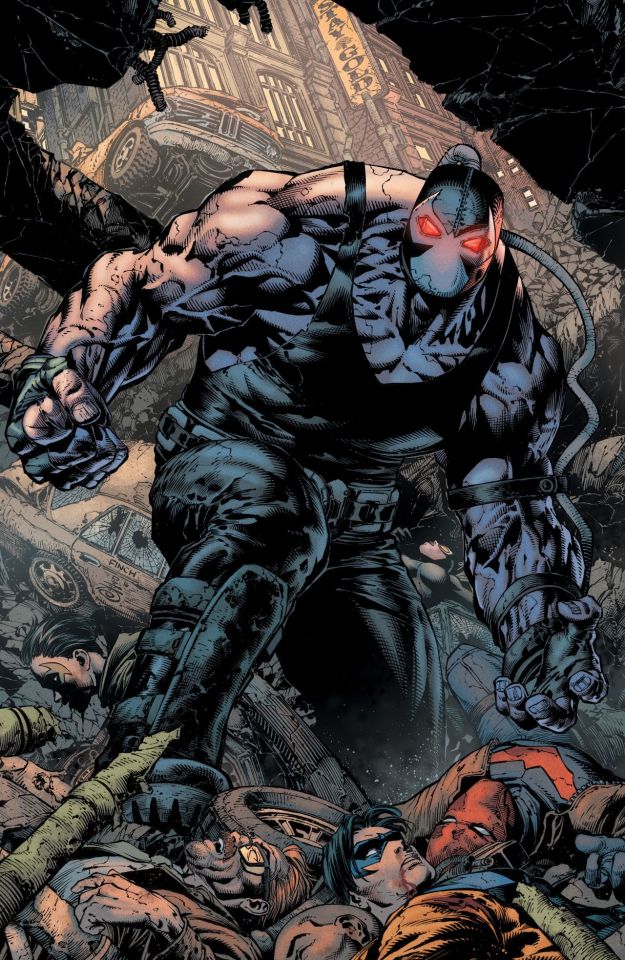
has me cornered, and Batwoman shows up to "rescue me", Imma start praying. He'd swing her around by that red hair of hers until her head pops off.
Rambo - He’s like 80! C’mon, Sly. Please STOP.
Dark Phoenix - a movie about her temper tantrum
Joker -

- not with all of that awkward dancing he was doing
NOW, finally, the top Bad Ass Muthas of 2019!
12) Greta -

Say what you will about climate change, but you can't deny her passion and dedication, and how inspiring it is (unless you're Prez Trump or Fox News) to see and hear a kid like her do her thing. I admit that her winning the honor of "Person of the Year" is too much. But, we all wish our kids would be this dedicated to what they believe is positive change. Plus, she has a kickass soundtrack. Gets me hyped every time!
11) Dave Chappelle
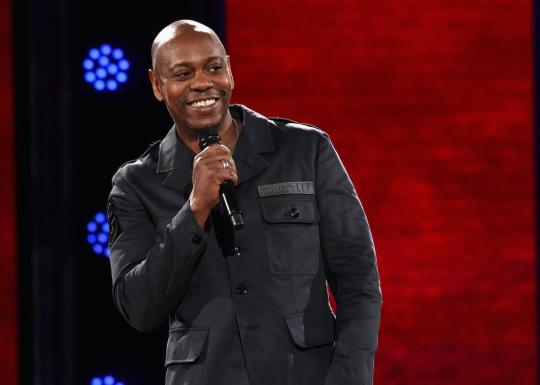
Back in the day, comedians used to be brought on stage, tasked with the difficult job of making a room full of different types of people laugh. Now, it's not just about the job of jokes, but you have to do so without offending anyone, and with clean living. When did we start holding a comedian's behavior to a higher standard than we do elected officials? Dave saw this, and kept doing what made him popular anyway. In a world where most comedians are running scared from difficult topics, Dave plunges right in. BAD ASS.
10) Linda Hamilton -

Old as bleep! We have what's-her-face here,

who is kinda badass herself, but despite being a badass cyborg (or whatever the hell she is), she still felt the need to ask for help from Linda bleepin Hamilton. LH traded her Hospice bingo card in for some guns and went to town on some machines! It'd be like if your home was being surrounded by aliens, and despite you having some fire power in your home and 911 at your disposal, everyone's first thought is to call grandma. That'd have to be one BAMF of a granny!
9) Masvidal -

Allow me to describe this brotha to y'all who might not know.
Some guy was talkin smack to Masvidal, and that guy got kneed in the face by Masvidal (fastest knock out in UFC history = 5 secs). Some guy was arrogant enough to say he was the baddest mofo around, and Masvidal scheduled a fight with this dude for a literal baddest mofo around belt. Plus, that same night of the fight, when he was talking to the media after he had won, he started mocking Conor McGregor, talkin bout Conor don't want none of this. He was talking trash, publicly, about Conor, while people were feeding him pizza. BADASS!
If there is ever a fork in the road, and on one side you see The Rock, Jason Statham, and Will Smith chasing after you, and the other you have Masvidal sitting down, eating a slice of pizza, you had better take your chances with the three action heroes over this BAMF.
8) Nunes -

If you don't know who she is, I wouldn't be surprised. The UFC botched her marketing before and after she fought and beat (badly) Ronda Rousey - yeah, RONDA ROUSEY; remember her? Nunes pretty much ended her career.
The UFC was so certain that Ronda was going to win, and so shocked when she lost, that they missed an opp to get behind a fighter who is better than Ronda (though mad respect for Ronda), and is currently holding TWO belts (first woman to do so). ALSO, she's the first openly gay UFC champ in history. She's so sweet too! - well, unless you're locked in the octagon with her, then she turns into a werewolf.
7) MANDO

I don't know about you, but all of this talk of teamwork from comic book movies can be a bit tiresome. The Avengers, The Justice League, The X-Men. Everybody wants to form a band. What happened to solo acts? What happened to lone rangers? People may say "There's no I in TEAM." Yeah, that's the prob! What about I?! Sometimes, you're Justin Timberlake, and the rest of the group is simply holding you back. That's Mando. He's Disney's updated (non-racist, unless you’re talkin drones) Lone Ranger. He doesn't need teamwork (maybe a weekly cameo, and a baby tag-along, but that's it!). He has beaten up gangs of robots, burnt people up, taken people out Jason Voorhees style, cut people in half, blown people up, blown off heads, BUT because it's Disney, we haven't seen any of that good stuff. He'd be higher on this list if they gave my man an R-rating.
6) Capt Marvel -

Captain Marvel is definitely the most powerful person on this list. She is probably also the fiercest person on this list. In Endgame, when she saw her black daddy (Nick Fury) on the screen, talkin bout Thanos snapped him away, and then something snapped inside of her, and she said "I'm going to go kill that mofo." The Avengers accompanied her, but I don't think she would have needed their help. She didn't really need their help in the final showdown with Thanos. He threw her aside, but you know she was coming back, until Tony got in her way. She is so fiery that it wouldn't surprise me if in her sequel, she goes back in time in order to rematch Thanos by herself, to prove her dominance. The reason that she's not higher on the list is because she's so damned destructive. She's just like The Hulk in the fact that she shows up to destroy everything. Now, she's a lot more focused than The Hulk, but she's so powerful that she does more damage. And she doesn't have much of a personality (so far), so it's hard to gauge her badassery of attitude, you know?? Like, if you're a villain, and you get in the way of a gorilla, that gorilla will destroy you in a very spectacularly badass way, but... it's a gorilla, you know??
I’M NOT CALLING HER A GORILLA. Don’t go snitching on me to her.
I just don’t know if she’s a hero or simply has anger management issues. Is she badass or too powerful not to do badass things?
Either way, RESPECT... or she'll come for that ass.
TIME FOR A BREAK -
Let’s break from all of this badassery with some cuteness
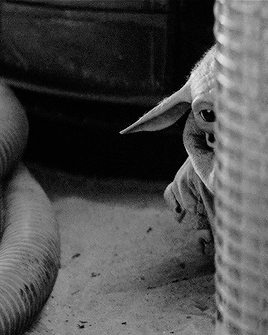
Look how cute it is - I CAN’T TAKE IT!
Ok, back to action.
5) Iron Man -

Look, Iron-Man started this shit! Who knows what would have become of the MCU had Robert Downey Jr. blew it. Tony Stark assembled the team (granted, he was partly the reason for the break-up), he gave us Spider-Man (with that suit) (he also gave us Ultron, but let's not get bogged down with details), he held his own against Thanos in "Infinity War",
Dr. Strange thought HIM worthy of saving, and no way time travel would have worked in "Endgame" without him. Plus, in the very end, he out-smarted Thanos, and countered Thanos' one-liner ("I am inevitable.") with his own ("And I... [five minutes later - I swear that's what it felt like] am Iron-Man.").
Paid the ultimate sacrifice. Hell yeah, he's on this list. I felt kinda bad for his wife. After IM3, she was barely around. And when Tony died, she was barely comforted... cuz nobody knew her. Oh, well.. she be aiight.
4) Thanos -

This dude saw his demise coming, and still went straight ahead towards the foes who cut his head off. BADASS! He was exceptionally crafty in playing The Avengers and blowing up their base. Then, he was just sitting around waiting for the main Avengers (Capt, Iron, and Fat Thor). He wanted to gloat a bit first. BADASS! And had Gamora not betrayed him, and had given him the gaunlet, he would have beaten The Avengers AGAIN!
He even died with a cool pose (he took a knee and got his "Thinking Man" on). BADASS!
3) Arya Stark -

This young lady scared the bleep out of me. She has my fear AND respect. I was actually scared for whomever her current target was... I was like "Run, fool! She gonna get ya! Damn, Arya, you didn't have to do them like that!"
Now, I know I talked about Ruby Rose being a ridiculous choice for Batwoman, but if Arya Stark left on a voyage to Gotham and became Batwoman, I'd buy that. I can see her killing Bane very slowly. This woman is a frickin psychopath, and I love it. She's fearless! She also went up against the top cheese of the white walkers. Y'all remember that badass move she had at the end!
YES! I only wish she had said something cool when she took him out, like... "You've been Starked." No, that's terrible, but something like that. I wish she was the one sitting on the throne, but they... you know... did what they did.
2) Capt America -

I think that it's fair to say that Capt America was the rock of The Avengers After the snap, he was the only one to keep his shit together; he actually worked to help others keep their shit together.
Meanwhile, Widow is crying in the dark every night while having a PB sandwich and bourbon dinner. And she just gave up on her hair.

Thor became an alcoholic.
And you could say Hulk was ok, but... was he?

I mean, that ain't right. This is avoidance behavior if I've ever seen it.
But, Capt kept it together. Then, that fight with Thanos at the end was one of, if not THE best one on one fight of the series. Using both Thor weapons, meaning he was both badass on a fighting level and a righteousness level - which ain't easy to accomplish. And when he straped tight his shield in that trailer, and gritted his teeth - hell yeah!

Chills. Capt to Thanos: You motha bleeper"
1) John Wick -

Three movies with no time in-between to shower, sleep, take a piss, brush his teeth, NOTHING! His life for the last few years (it seems like) has been running, lurking, hiding, beating ass.. and beating ass some more. Lord knows what this dude's kill count is up to. His nickname is "Baba Yaga" Have y'all seen what the actual Baba Yaga looks like?

Terrifying. And yet, not as terrifying as John Wick when he's angry at you.
The amount of endurance and focus that has gone into this long stint of murdering (only fueled by rage and a few shots of bourbon from time to time) is uncanny.
In JW3 he makes a guy eat a book (imagine what must be done to a person's jaw for that to happen), he gets shot, stabbed, hit my two cars (seconds within each other)... Nah, y'all ain't hear me! TWO CARS! The people in the cars were trying to kill him! He fought two super ninjas - like IP Man caliber, he beat up an army of soldiers, crawled through a desert, got shot by a friend who betrayed him, fell off of a building (bouncing around a few times before hitting the pavement), and was somehow still good to schedule a fourth movie after all of that - which I assume will pickup right there.
He doesn't have any superpowers (though you wouldn't know), but his tenacity is to be envied, and outdoes everyone else's on this list.
BAMF!!!
#John Wick#john praphit#bamf#marvel#thanos#praphitproductions.com#Captain Marvel#captain america#tony stark#The Avengers#praphit#terminator#Linda Hamilton#Arya Stark#baby yoda#the mandalorian#disney#batwoman#dave chappelle#greta thunberg#jorge masvidal#amanda nunes#action movies#Rey
24 notes
·
View notes
Text
Facing Your Demons - Season 6 Character Speculation: Raven
I know - we’re about to go into ep 10 of S6, and including that one, there’s only 4 more to go. But this season has been honestly crap for character speculation, IMHO, because so much is happening that seems like it’s for plot purposes rather than actual character motivation. I could go on about that but in this post, I’m trying to do something else. FYI - this post contains spoilers for all of Season 6 so far.
In mid-May, I did a character spec for Murphy, found here. It hasn’t come 100% true but it’s not been completely false either. But I never could write one for Raven because her storyline has just been... a mess, frankly. A bleepin’ mess. But that doesn’t mean I’ve stopped thinking about it at any time.
With regard to Facing Your Demons, Raven has been dealing with this theme since 6x01. Her fast involvement with Shaw is part of it, and I wrote about that here and here. She comments in one of the first scenes about how Monty and Harper “left us” - Raven has always felt left behind by the ones she loves. It’s a fear of hers, it’s absolutely a demon. I think she feels at this point that it’s a punishment towards her specifically, and part of what makes her think she can’t be happy/doesn’t deserve happiness. Her mother basically abandoned her, Finn chose someone else over Raven and then abandoned her in death, Sinclair left her, Wick went up in smoke, Clarke said she would choose Raven first but then doesn’t (resulting in feelings of abandonment), Abby abandons her by choosing the drugs instead, Shaw abandons her by dying, so do Monty & Harper, and even to an extent Spacekru abandons her when they go to the ground in S5 without Raven even though this is what Raven intends. (Ah, but Murphy doesn’t abandon her and in fact is one of the only people to ever tell her “I’ve got this” rather than “you’ve got this”, which is what everyone tells Raven because they rely on her so much... but that’s another meta).
So abandonment is a really big deal to Raven, it’s why she’s lashing out so much this season. But I feel like we finally saw a turning point when Raven chose to prevent Abby from taking the Zero-G spacewalk in 6x08. She’s still angry with Abby (understandably IMHO), but she’s not going to let Abby die even though she doesn’t agree with what Abby is doing. This is Raven both taking back control AND facing a demon - she literally says so “I couldn’t save my mother but I can save you.” Doesn’t get much clearer than that! Raven is actively healing a part of her past trauma (from her mother) by action she’s taking now (saving Abby).
Also, Raven makes a clear stand this season when she says she wouldn’t murder anyone to bring back someone she loves. This is maybe not that important to anyone else because it’s just a moral judgment that Raven is making, but to RAVEN this is an important decision because she’s acknowledging in her own mind that despite her losses, no matter how big they felt to HER, there are some lines she won’t cross. This is another aspect of taking back control, Raven is CHOOSING who she wants to be.
To me, Raven has been existing in the pain side of the “I don’t choose pain, I choose life” situation she had to make in S4. Maybe this was not consciously on her part, but she’s been wallowing in the ramifications of S5 to at least 6x08, IMHO. But she’s coming back around to herself via the examples I’ve already given, AND when she made the choice to let Abby go to Kane to say goodbye, even though this was against Kane’s wishes, angered Indra AND it’s not like Raven is thrilled with Abby right now and was just being nice. This actually super fits in with Face Your Demons, because tying in to that is how Raven didn’t get to say goodbye to Finn. She’s giving Abby the thing she herself needed, again actively healing a part of her past trauma by action she’s taking now.
So what could come next? Well if I had my way, Raven would continue facing her demons which would allow for healing from past events and give her back some agency and also reassurance that she is not just loved but worthy of being happy. This is t100 though so you all know I don’t have much faith in THAT! But... what if... all props to @jarleene for bringing up this possibility during a chat, because the more I think about it, the more I wish we could see it. We know Murphy is going to be tied to a pole in the very near future, his life probably threatened. Who does that remind you of? Oh, was Finn tied to a pole? And Raven could do nothing to save him, had to watch him be killed in front of her? What if Raven could heal some of that past trauma by being able to save Murphy? Shipping aside, Spacekru is family - Finn was family to Raven, Murphy is family too. If she can save Murphy, she heals part of her own past trauma. AND he can heal part of his own too because no one came to rescue him from the Grounders, no one came to rescue him when he was hung. Murphy is not used to being rescued/feeling worthy of that type of sacrifice. But if someone in his family rescues him from the Primes, this goes a long way towards making him feel worthy and also forgiven, which is something he needs.
It’s probably too neat, tidy and logical for t100 though, so maybe I ought not get my hopes up! Anyway, I have a lot of thoughts about how most of the characters are stepping into someone else’s shoes from S1. I keep meaning to put that into a meta, but a small example is how I think Raven is mirroring Murphy’s anger and lashing out in S1, and how Murphy is mirroring Bellamy’s S1 arc of being out for himself/his own goals and kind of chaotic.
Of course, I could be grasping at straws and what’s really going on is poor characterization due to plot and new writers who don’t “know” these characters over 5 seasons or who care more about sci-fi than whether the characters would actually act in this way.... Regardless, sticking with FACE YOUR DEMONS, we are actually seeing some of that onscreen and I hope that for my two faves, it might result in something good for a change.
Yeah, I’m not holding my breath! LOL!
12 notes
·
View notes
Text
7 Editing Tips That’ll Make You a Better Writer (with Examples!)
There are some bloggers who seem to have a natural gift when it comes to writing. Some bloggers seem to be naturally gifted writers.
They manage to get their ideas across clearly and economically, which means that readers can easily follow what they write. Readers devour their clear, economical prose.
Not only is there a lot of respect for what they have to say, but also the way that they say it. People respect what they say — and love how they say it.
Whenever they publish a new post on their blog, it always gets dozens of comments and hundreds of shares. Every new blog post attracts dozens of comments and hundreds of shares.
It would be great to be as successful as they are, but you don’t know what you need to do to make your writing better. You’d love to emulate their success, but you don’t know how.
The good news is that there are some editing tips that can easily learn which will improve everything you write from now on. Fortunately for you, a few simple editing tips can transform your writing forever.
Download a free PDF cheat sheet with seven questions that make it easy to edit your writing like a pro. Click here.
The Unfair Advantage Popular Writers Try to Hide
You know your writing heroes? Would you be shocked to learn that their writing is no better than yours?
Sure, the end product is better, but the first draft is just as clumsy, flabby, and downright difficult to read as any of your own writing efforts.
What popular bloggers know that many people don’t know (or don’t want to believe) is that a post isn’t finished simply because they’ve said everything they want to say. In many ways that’s just the beginning.
Think of your draft as a rough diamond. Value is hidden inside it and you need an expert gem cutter to reveal its beauty and clarity.
Which is why many top bloggers hire a professional editor to transform their rough diamonds into gleaming jewels. That’s right — someone else is helping them.
Somewhat unfair, right?
No wonder their writing seems so much better than yours. And even those bloggers who don’t use an editor have simply learned how to edit their own posts like a pro.
Fortunately, editing isn’t rocket science. If you have someone to show you how.
So let’s break down the rules that’ll help you transform your unremarkable draft into a perfectly polished post.
7 Editing Tips That Will Totally Transform Your Next Post
Tip #1. Don’t Pad Your Prose with Empty Filler Words
(Or: Avoid Using Grammar Expletives)
Grammar expletives are literary constructions that begin with the words it, here, or there followed by a form of the verb to be.
(Expletive comes from the Latin explere, meaning to fill. Think smelly literary landfill).
Common constructions include it is, it was, it won’t, it takes, here is, there is, there will be.
The problem? When it, here, and there refer to nouns later in the sentence or — worse — to something unnamed, they weaken your writing by shifting emphasis away from the true drivers of your sentences. And they usually require other support words such as who, that, and when, which further dilute your writing.
Let’s look at an example:
There are some bloggers who seem to have…
The there are expletive places the sentence’s focus on some nebulous thing called there instead of the true focus of the sentence — some bloggers. And the writer must then use another unnecessary word — who — that’s three unnecessary words in one unfocused sentence.
Train yourself to spot instances of there, here, and it followed by a to be verb (such as is, are, was, and were) and adjust your sentences to lead with the meat and potatoes of those sentences instead.
(Tip: Use your word processor’s find functionality and search for there, here, and it and determine if you’ve used an expletive).
Other before-and-after examples:
It’s fun to edit — Editing is fun
It takes time to write — Writing takes time
There are many people who write — Many people write
There’s nothing better than blogging — Nothing’s better than blogging
Here are some things to consider: — Some things to consider are:
Caveat: If you previously described an object using there, here, and it, you’re not guilty of an expletive infraction. For example:
I love editing. It’s fun. (This is not an expletive construction since I previously described what it refers to.)
Tip #2. Don’t Weaken the Action with Wimpy Words
(Or: Avoid Weak Verbs; Use Visceral and Action Verbs Instead)
Not only does to be conspire with it, there, and here to create nasty grammar expletives, but it’s also responsible for its own class of sentence impairing constructions.
Certain uses of to be in its various forms weaken the words that follow. The solution is to replace these lightweights with more powerful alternatives.
Let’s see some before-and-after examples:
She is blogging — She blogs
People are in love with him — People love him
He is aware that people love him — He knows people love him
Other verbs besides to be verbs can lack strength as well. Use visceral verbs or verbs that express some action. Let’s edit:
Give out — Offer
Find out — Discover
Make it clearer — Clarify
I can’t make it to the party — I can’t attend the party
He went to Mexico — He traveled to Mexico
Think of a blogging strategy — Devise a blogging strategy
Tip #3. Don’t Cripple Your Descriptions with Feeble Phrases
(Or: Avoid Weak Adjectives)
Weak adjectives sap the strength from your writing just as nefariously as weak verbs. Use the best adjectives possible when describing nouns and pronouns. And be mindful that certain words, like really and very, usually precede weak adjectives. Take a look:
Really bad — Terrible
Really good — Great
Very big — Huge
Very beautiful — Gorgeous
Even if you don’t have a telltale really or very preceding an adjective, you can often give your writing more impact by using stronger alternatives:
Dirty — Filthy
Tired — Exhausted
Scared — Terrified
Happy — Thrilled
Even worse than using weak adjectives is using weak adjectives to tell your readers what something isn’t as opposed to telling them what something is:
It’s not that good — It’s terrible
He’s not a bore — He’s hilarious
He’s not very smart — He’s ignorant
Tip #4. Trim Flabby Words and Phrases
(Or: Avoid Verbose Colloquialisms)
Today’s readers have limited time and patience for flabby writing. Their cursors hover over the back button, so say what you mean as concisely as possible before your readers vanish:
But the fact of the matter is — But (Avoid flabby colloquial expressions when possible)
Editing is absolutely essential — Editing is essential (Absolutely is redundant)
You’re going to have to edit your work — You’ll have to edit your work or You must edit your work (Going to and going to have to are flabby expressions)
Due to the fact that editing takes time, some people avoid it — Because editing takes time, some people avoid it
Every single person should love editing — Every person should love editing (Single is redundant; and shouldn’t married people love editing too? 😉 )
Tip #5. Don’t Pussyfoot Around Your Verbs and Adjectives
(Or: Avoid Nominalization)
Nominalization occurs when a writer uses a weak noun equivalent when a stronger verb or adjective replacement is available. Like expletives, nominals usually introduce other unnecessary words when used.
Count the number of words in the before-and-after examples below, and you will witness how badly nominals weaken your writing:
Give your post a proofread — Proofread your post (verb form)
Alcohol is the cause of hangovers — Alcohol causes hangovers (verb form)
The plane’s approach was met with the scramble of emergency crews — The plane approached and emergency crews scrambled. (verb form)
He shows signs of carelessness — He is careless (adjective form)
She has a high level of intensity — She is intense (adjective form)
Tip #6. Throw Out the Rulebook on Punctuation
(Or: Use the Occasional Comma for Clarity)
The rules around punctuation can be complicated, even for the humble comma.
But do you truly need to know the difference between a serial comma, an Oxford comma, and a Harvard comma to write a great blog post? Of course not. (And it’s a trick question — they’re all the same.)
So my philosophy on commas is simple:
Use commas sparingly if you prefer, but if excluding a comma MAKES YOUR READER STOP READING, add another bleepin’ comma — regardless of what any comma police may say.
Let’s look at an example:
You can ignore editing and people reading your post may not notice but your ideas will get lost.
By not including a comma between editing and and, I read this sentence and asked myself, “I can ignore editing and people reading my post? Really?” Of course, readers work out the intended meaning a moment later, but by that time, they’ve already stalled.
So, regardless of what comma rule I may break by adding a comma to this sentence, as long as my readers don’t get confused and stop reading, I don’t care — and neither should you.
Let’s look at another example that needs a comma for clarity:
One day, when you find success you can pull out your golden pen and write me a thank-you letter.
By not including a comma between success and you, I read this sentence and asked myself, “Is success something you can pull out of a golden pen?”
Regardless of your stance on commas, you ultimately want your readers to keep reading. You want them to continue down your slippery slope of powerful content and transitional phrases all the way to your call to action — without getting jarred from their trance to contemplate commas with their inner editors or a Google search.
Tip #7. Be As Manipulative As Possible
(Or: Use Noun Modifiers Whenever You Can)
You won’t use this technique often, but at least be mindful of it.
When we use two nouns together with the first noun modifying the second, we are using noun modifiers. I like them because they hack the flab from our writing by shortening our sentences. Let’s review some examples:
Tips on editing — Editing tips
Great advice on how to boost traffic — Great traffic-boosting advice (Traffic-boosting is a compound noun here)
Information regarding registration — Registration information
These sentences have prepositions between the noun sets. Whenever you spot this construction, try to implement this noun-modifying technique.
Download a free PDF cheat sheet with seven questions that make it easy to edit your writing like a pro. Click here.
What’s Your Excuse Now?
These editing tips are not magical, mystical, or complicated. In fact, you could consider them downright boring, plain, and inconsequential.
But applying smart editing rules is what separates your heroes from the masses, catapults them to success, and makes readers say, “I don’t know what it is about their writing, but it’s absolutely fantastic.”
Look at it this way: You’ve expended a ton of effort on SEO, content marketing, networking, and social media promotion, all in the hopes that more people will notice your blog. So when they arrive, shouldn’t your next post blow their socks off too?
And how about your last post and the one before that? (Yes, you can apply these rules to your old posts too!)
Or are you one of those writers who think they write well enough already? Well, you might be surprised by just how many of these crimes against clarity you’re committing.
Open one of your posts right now and see how many of these editing tips you can apply.
Read each word of your post. Is the word an expletive? Is it a weak verb? A weak adjective? Does it represent nominalization or flab or break any of the other rules mentioned in this post?
Run each word of your post through this a checklist of editing tips. You will find something to improve. And your writing will be 100% more powerful as a result.
Because the search for perfection never ends.
And your writing is never too good.
Sure, proofreading and editing take time.
And yes, you’re already busy enough.
But your writing heroes edit, and they land the guest posts, book deals, and exposure you only wish you could.
So, take a break from #amwriting and start #amediting right now.
Your success will thank you.
And so will I.
About the Author: Shane Arthur is a former copyeditor for Jon Morrow’s kick-butt Guest Blogging Certification Program (affiliate link) that teaches writers just like you how to get their work featured on the world’s biggest blogs and online magazines.
The post 7 Editing Tips That’ll Make You a Better Writer (with Examples!) appeared first on Smart Blogger.
from SEO and SM Tips https://smartblogger.com/editing-tips/
0 notes